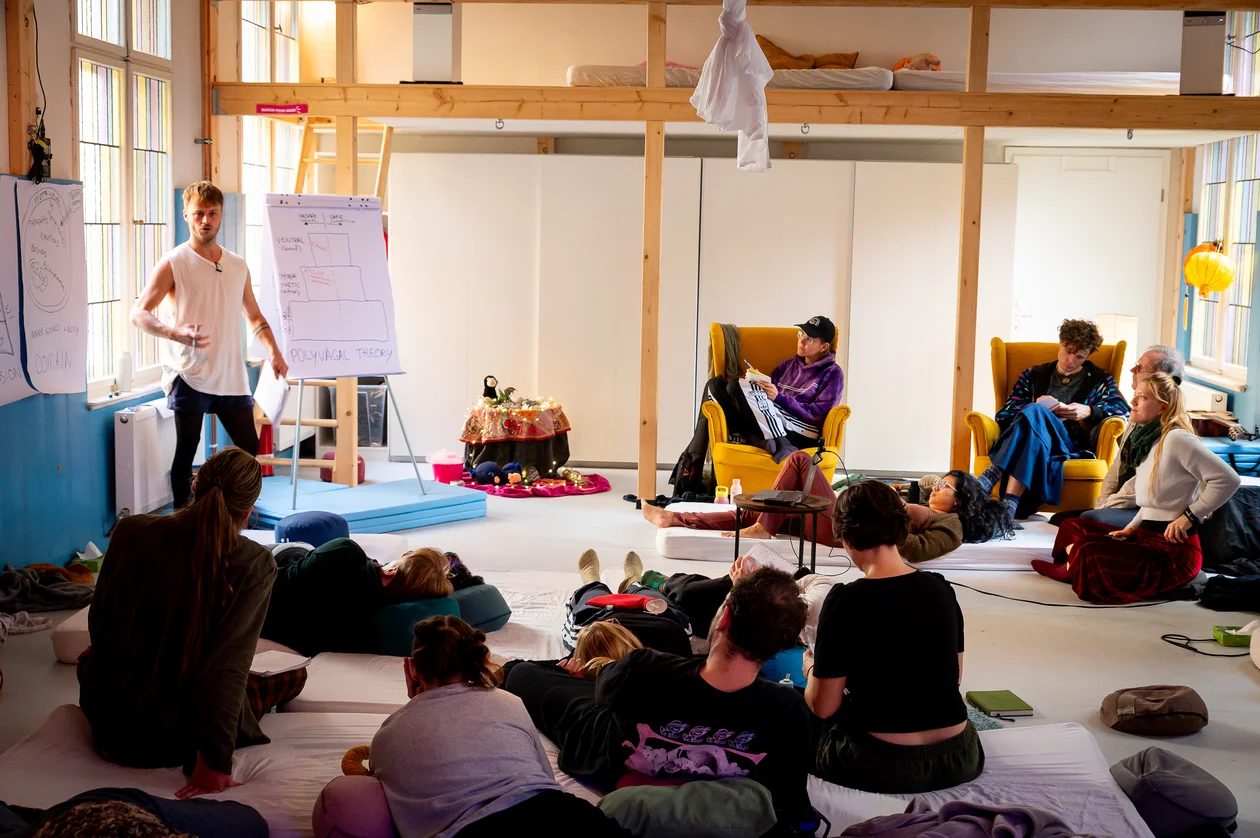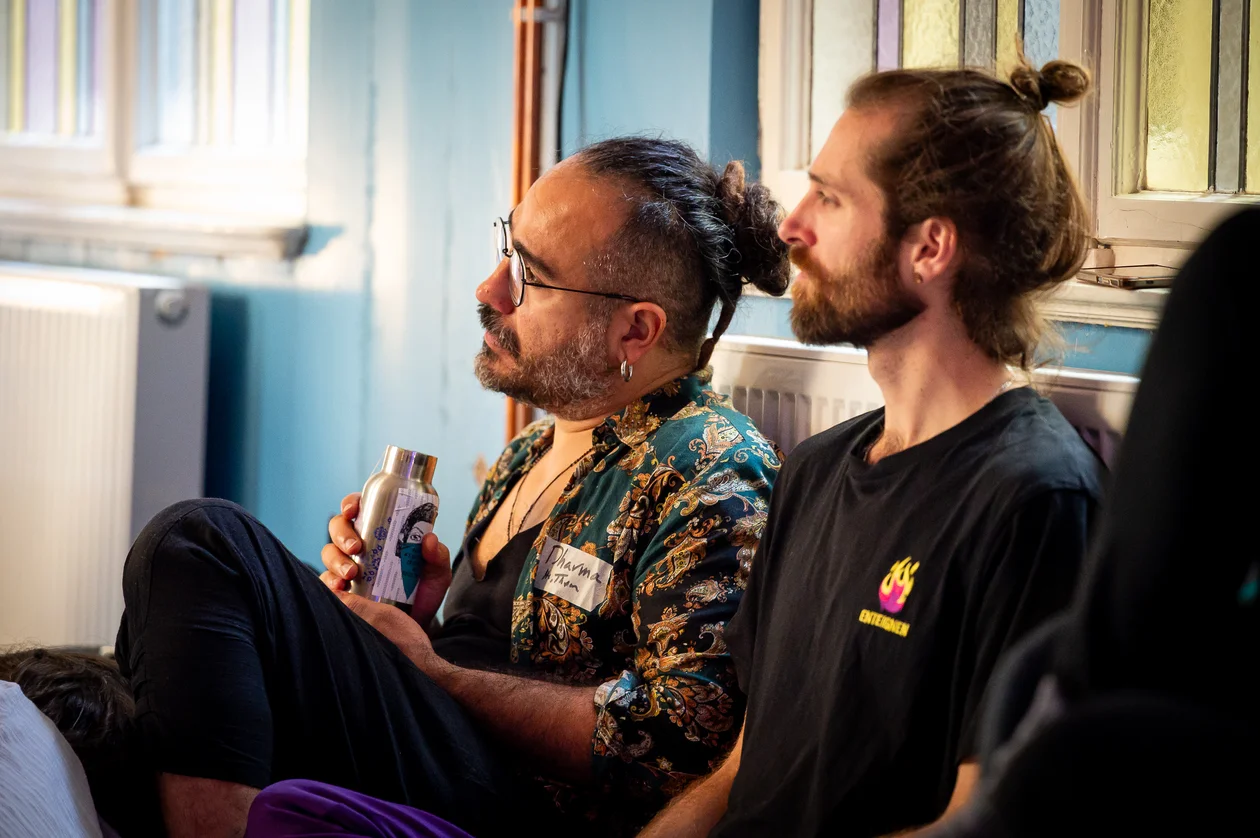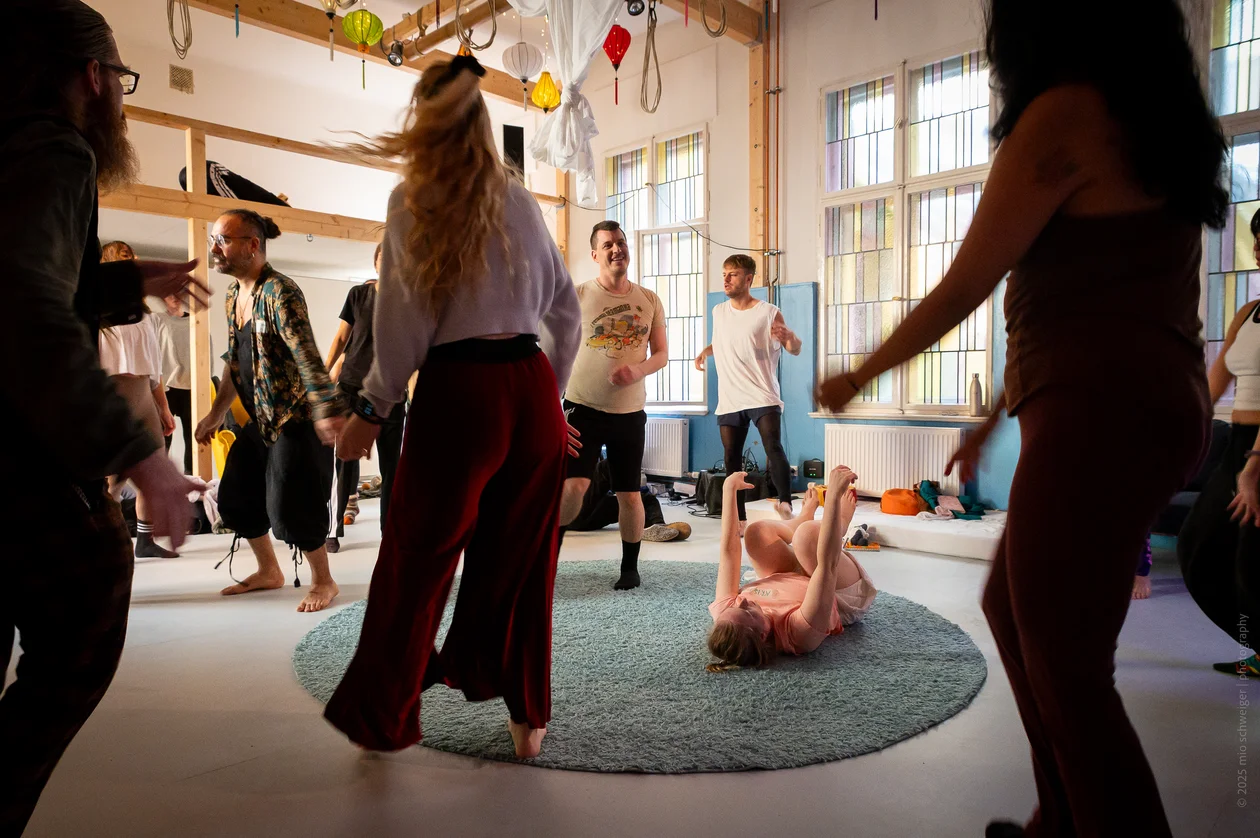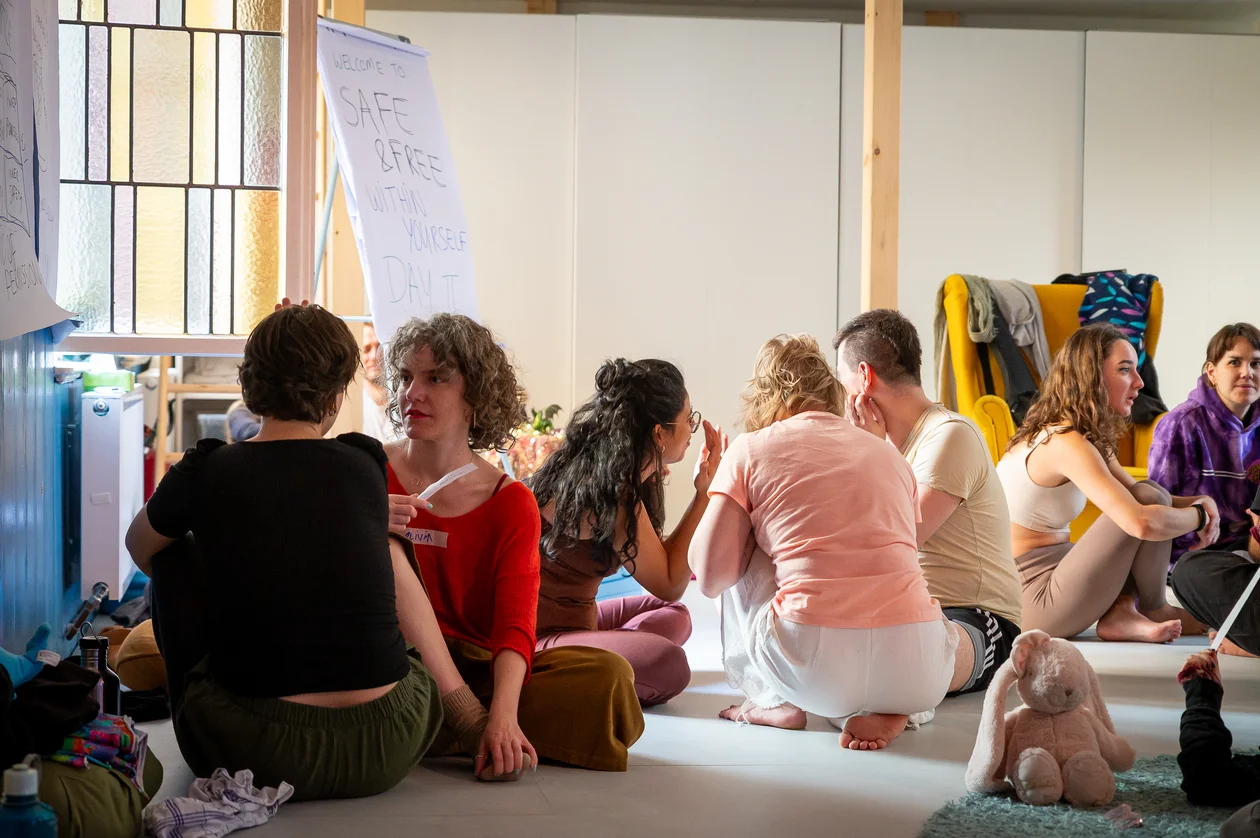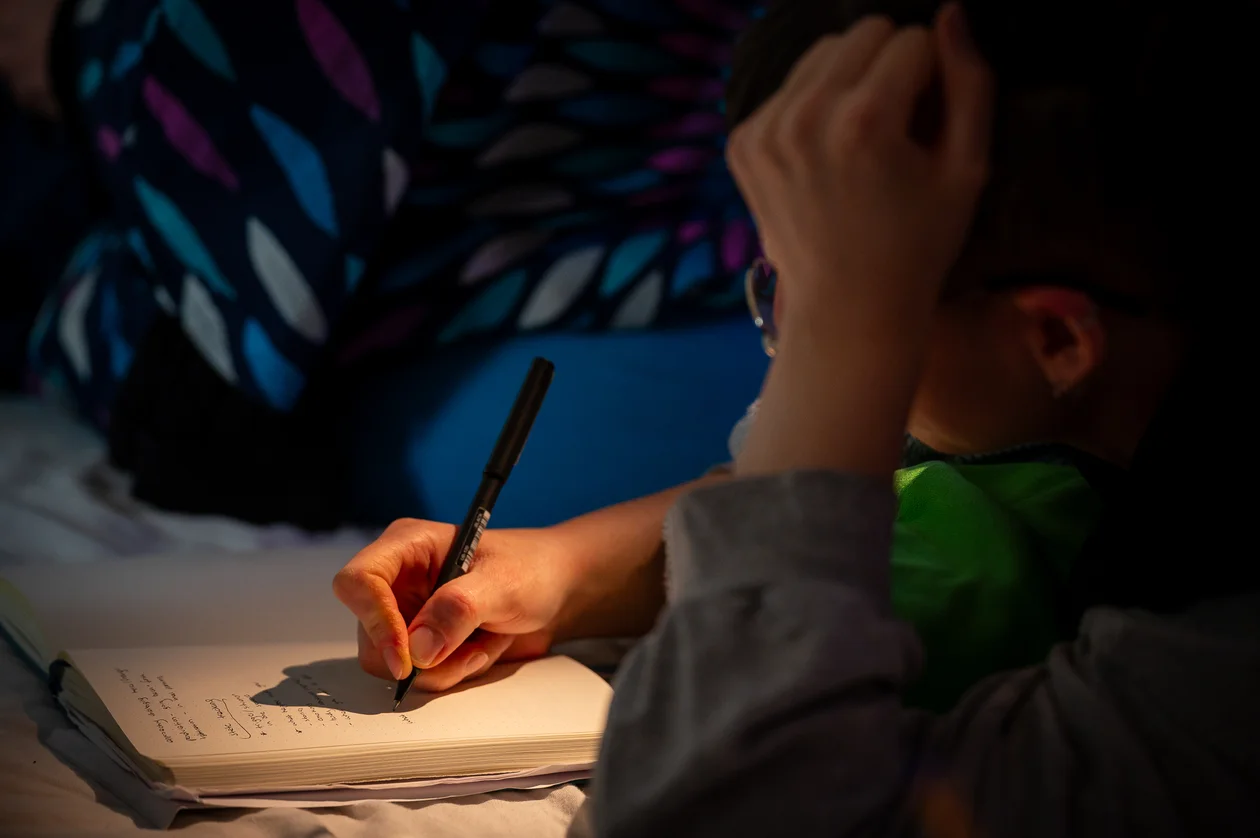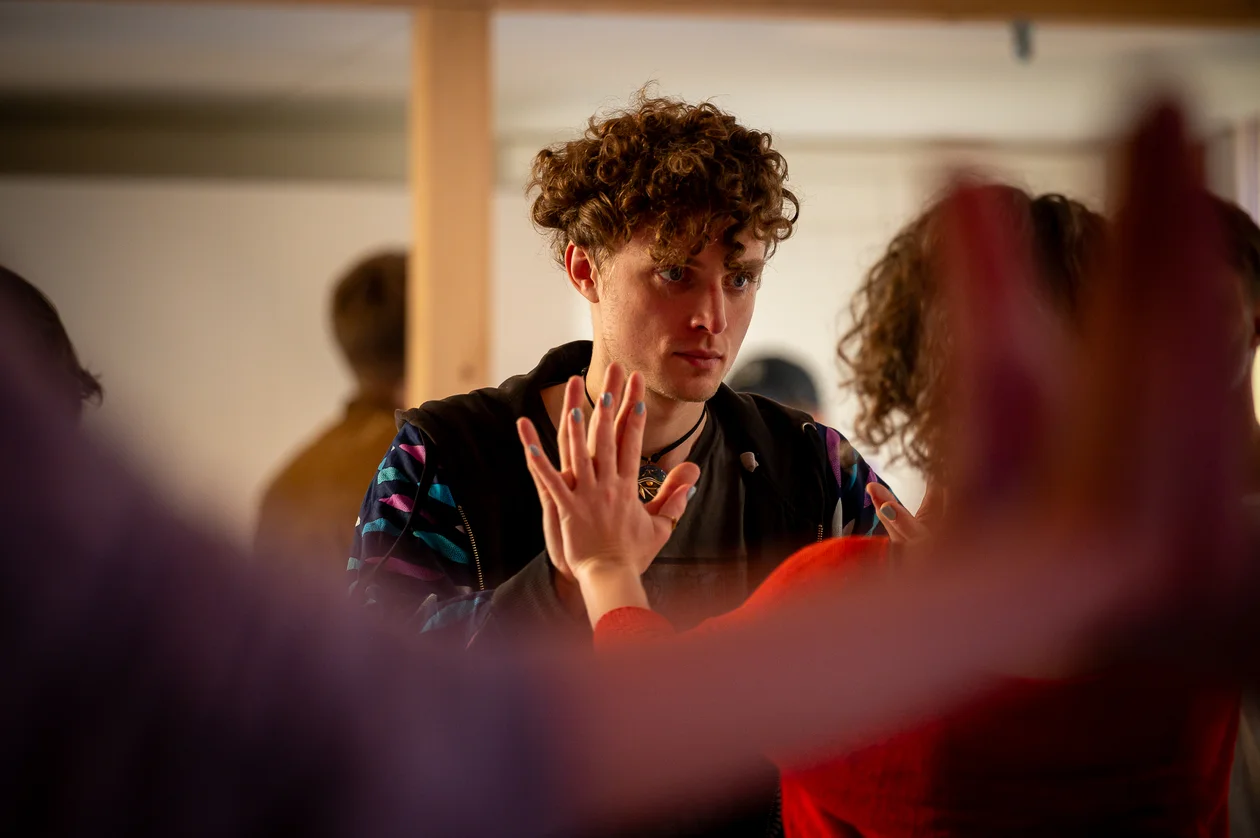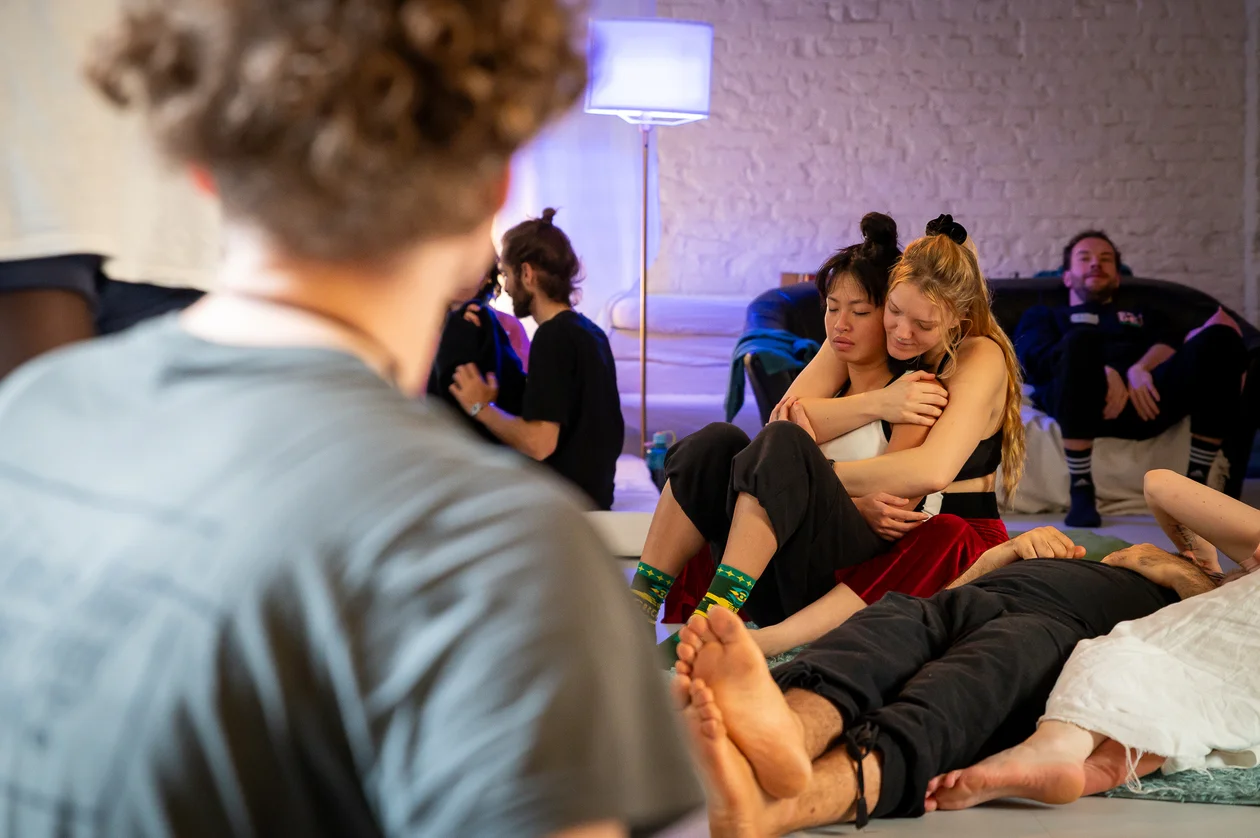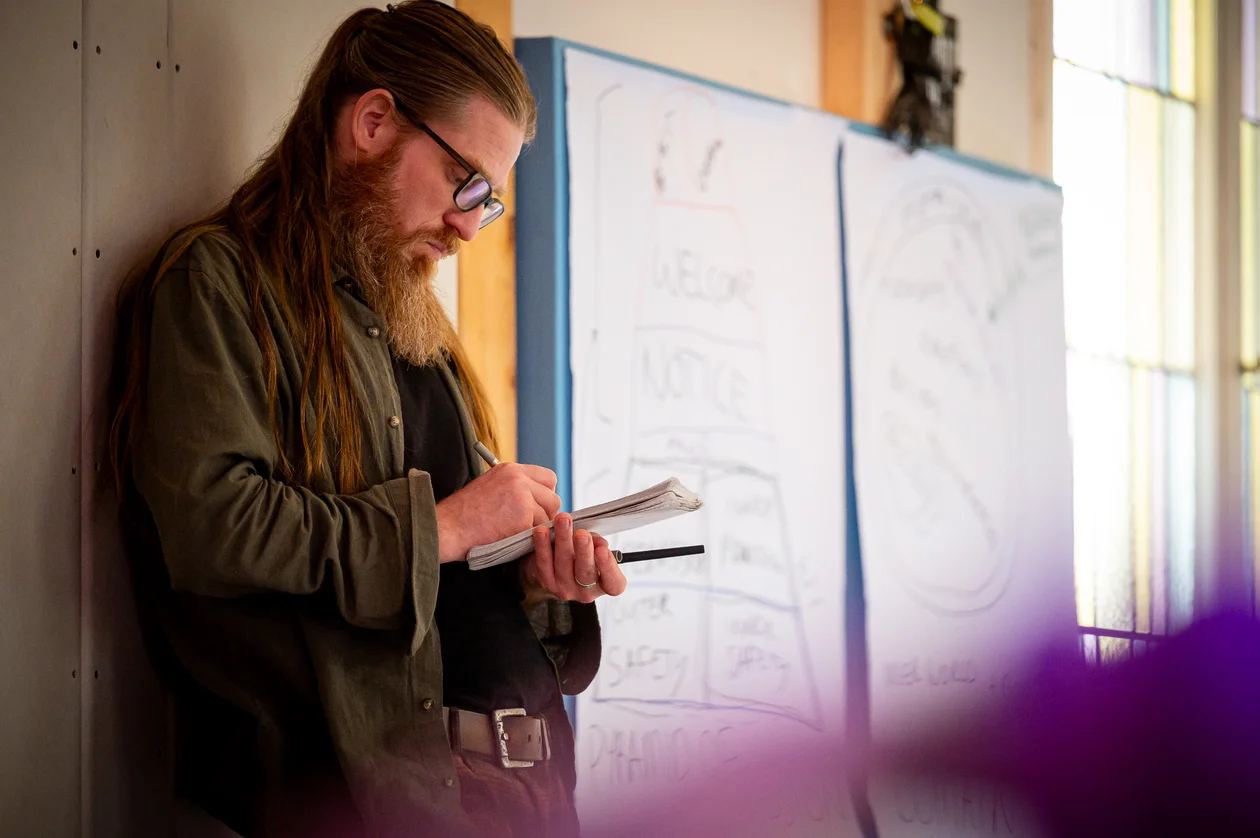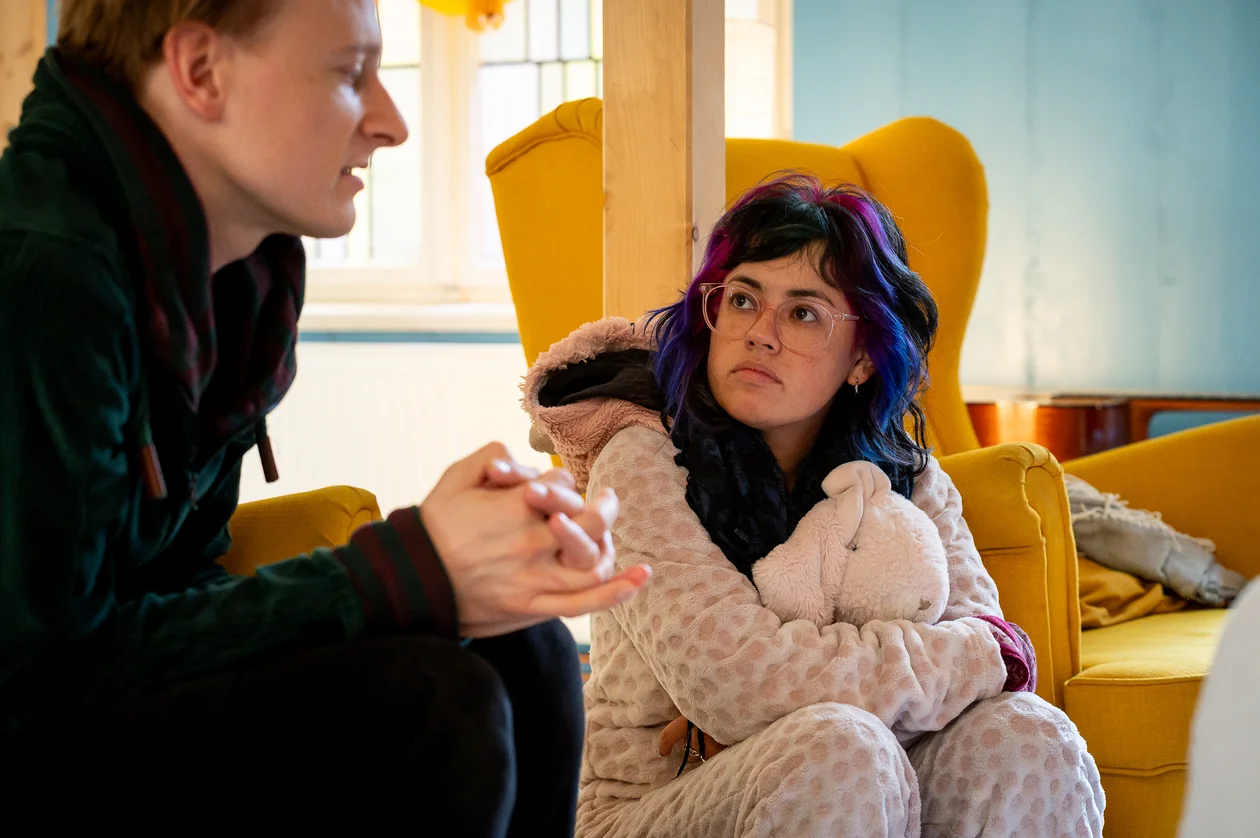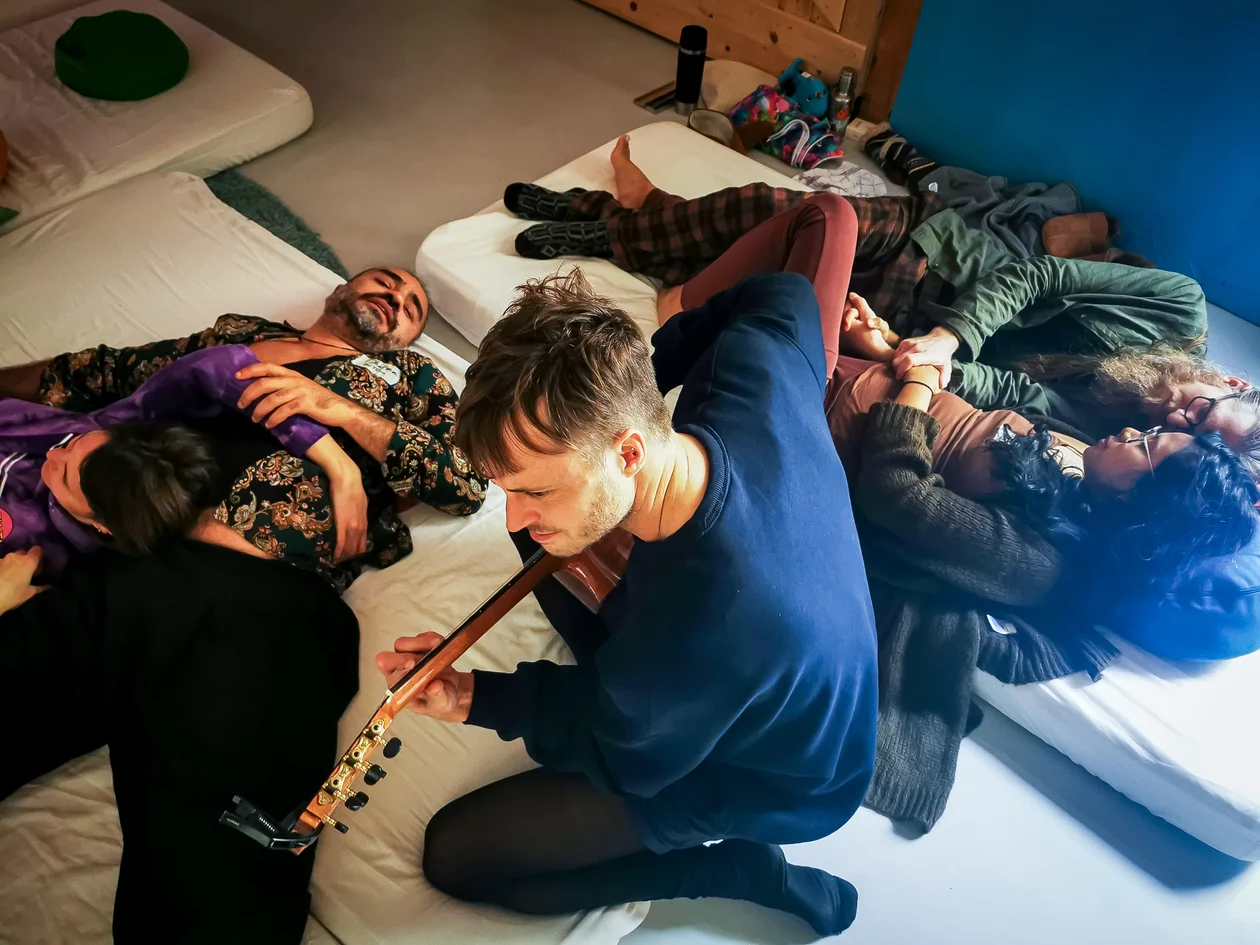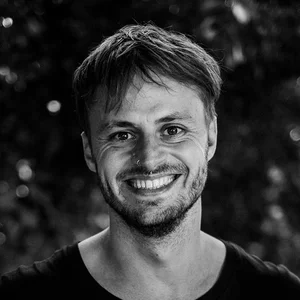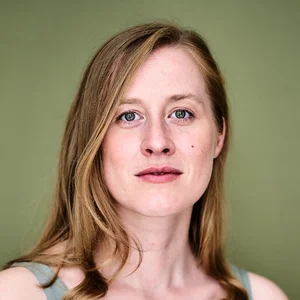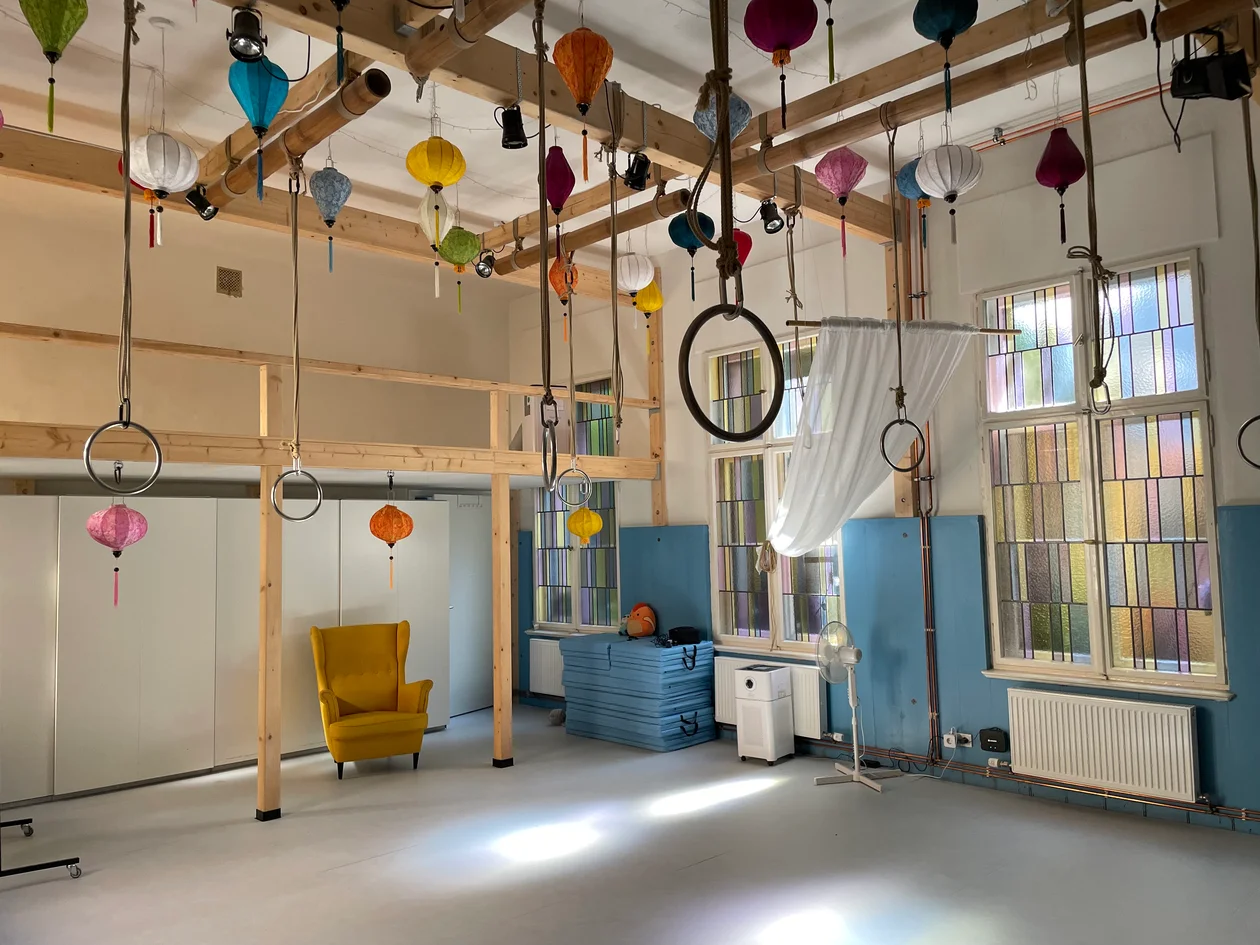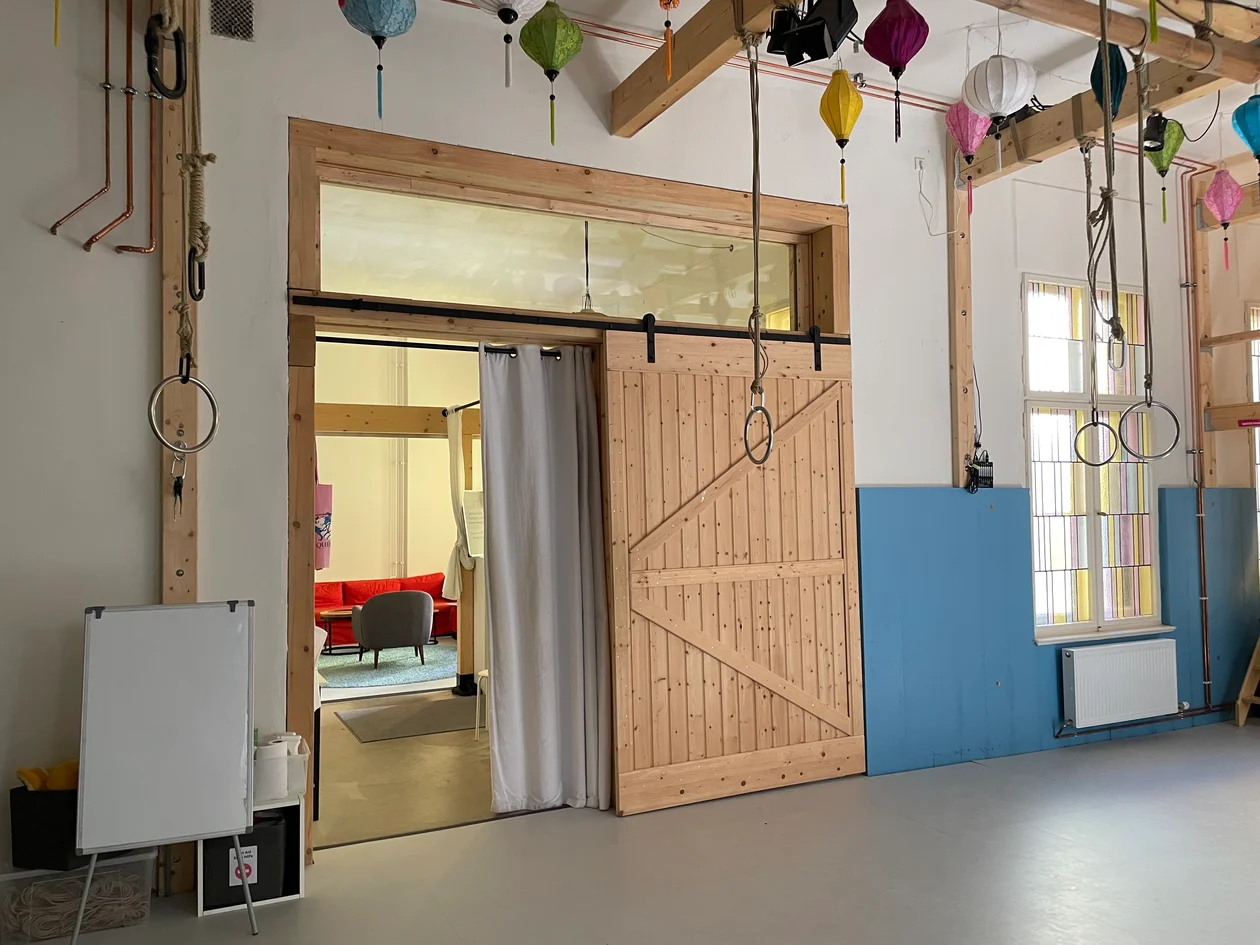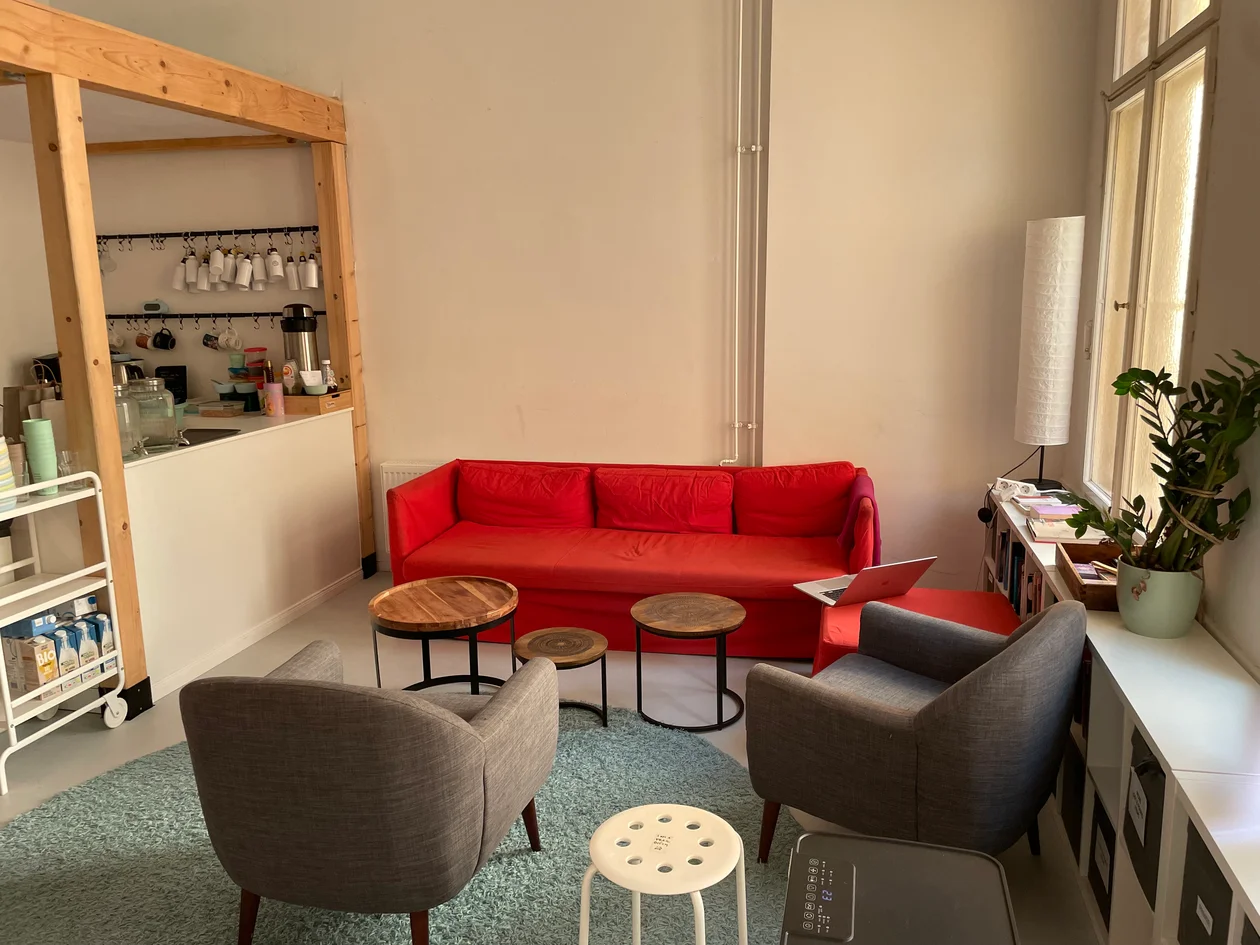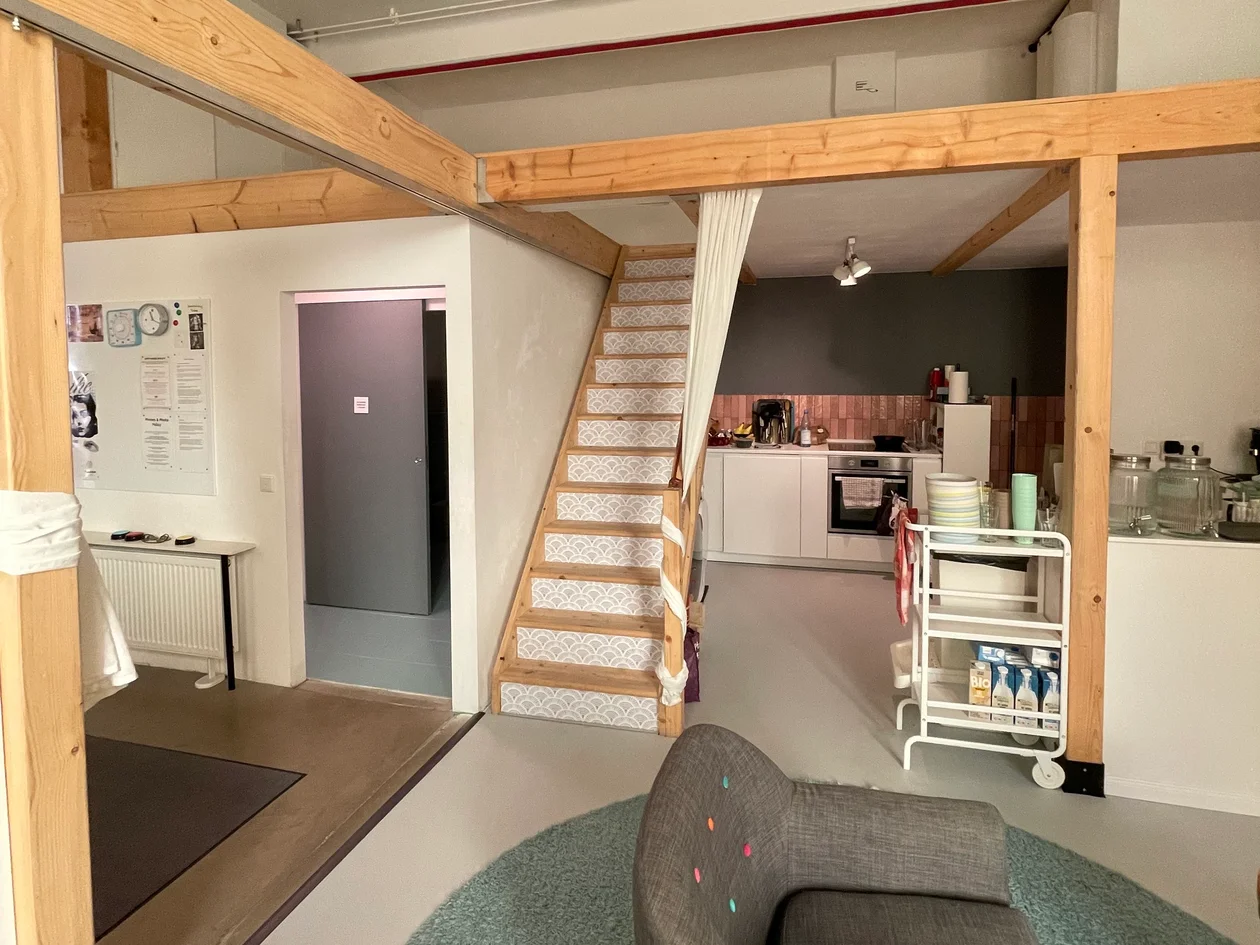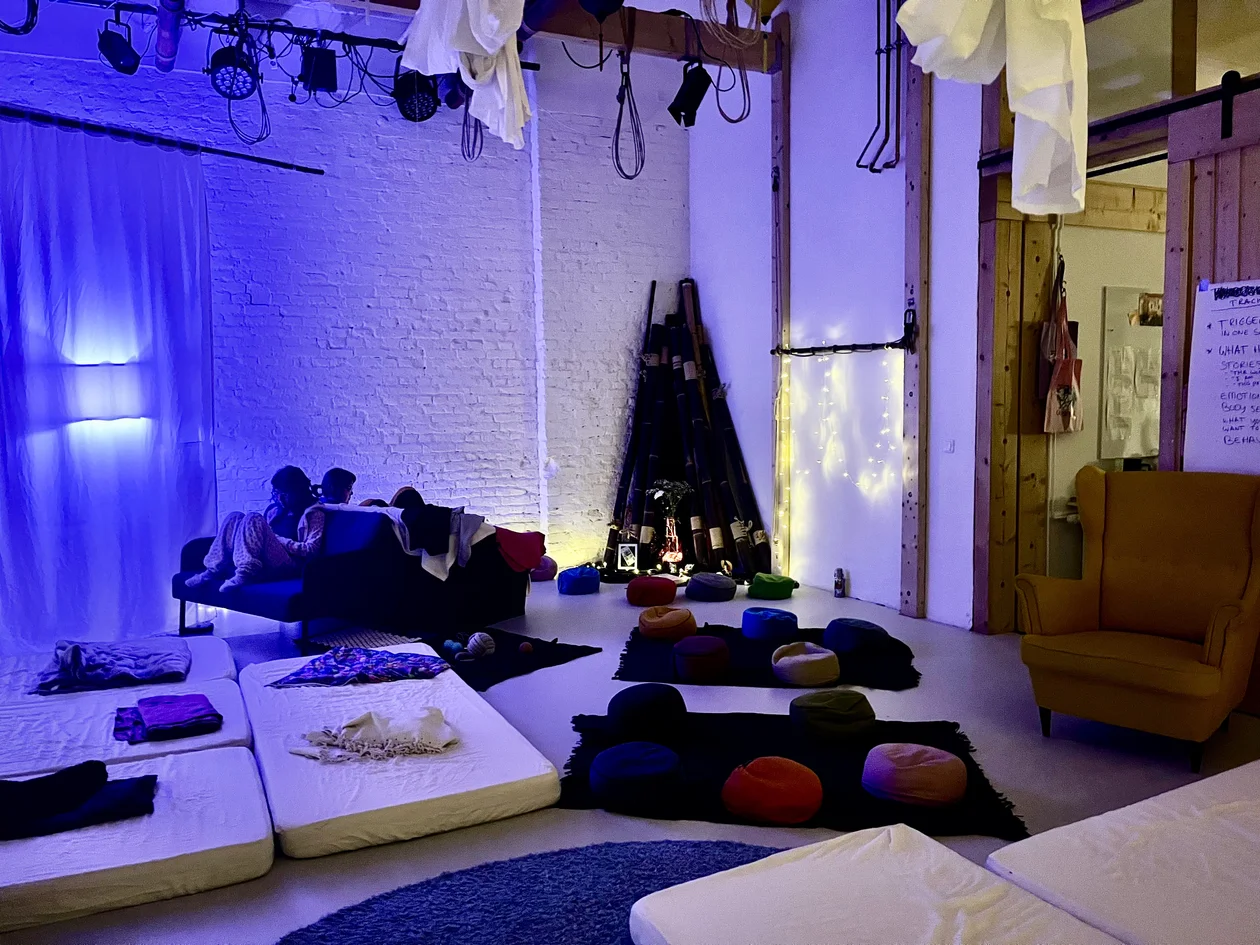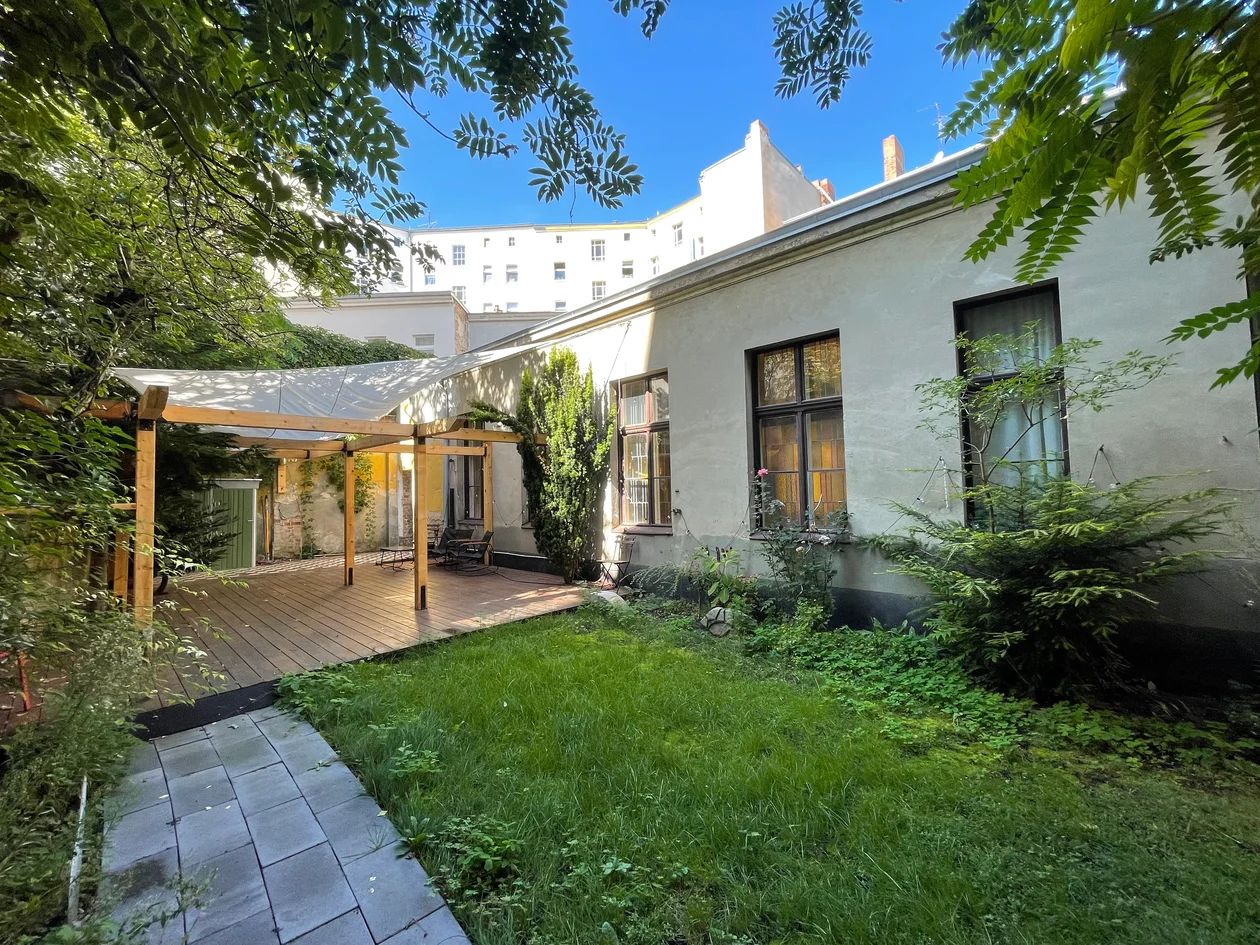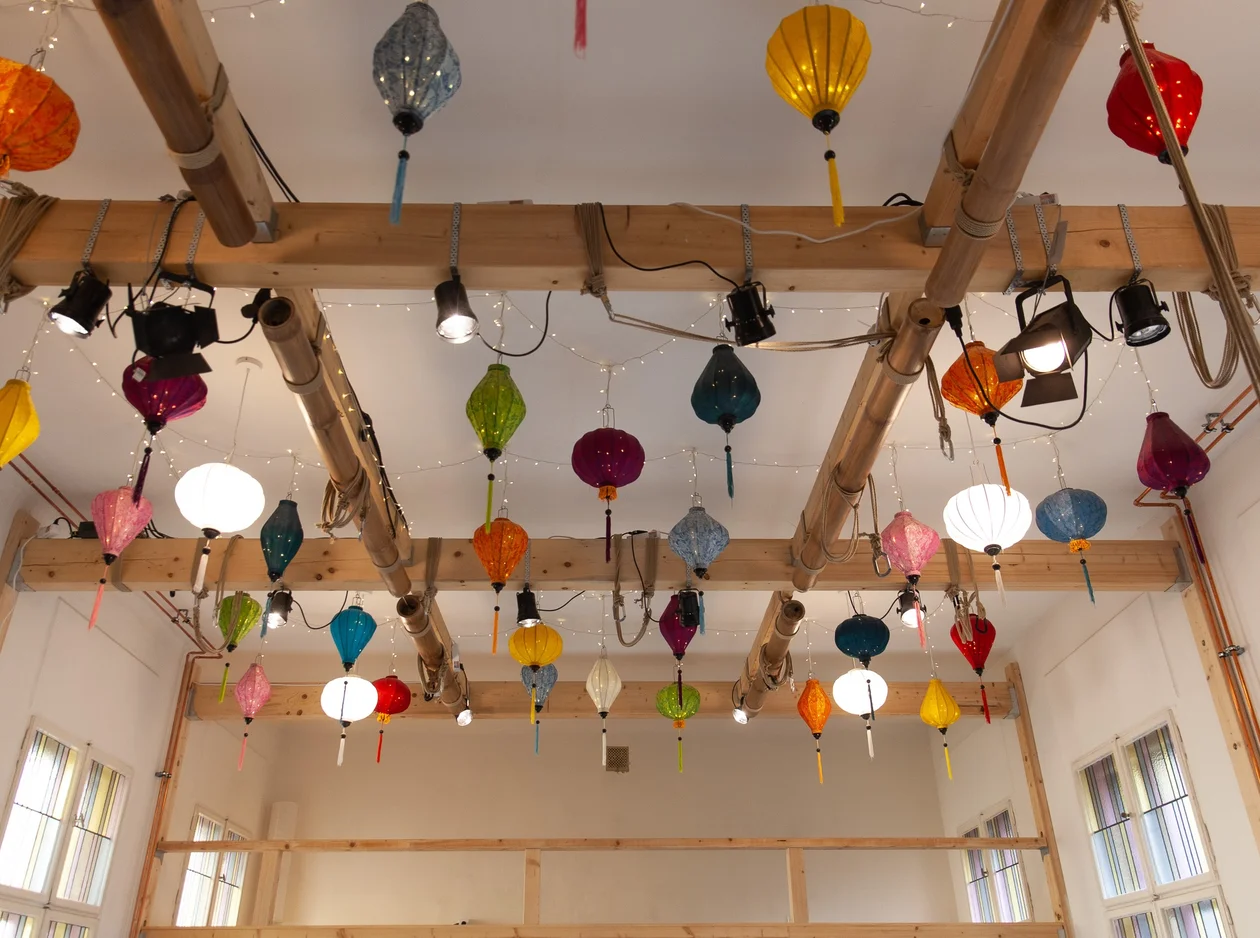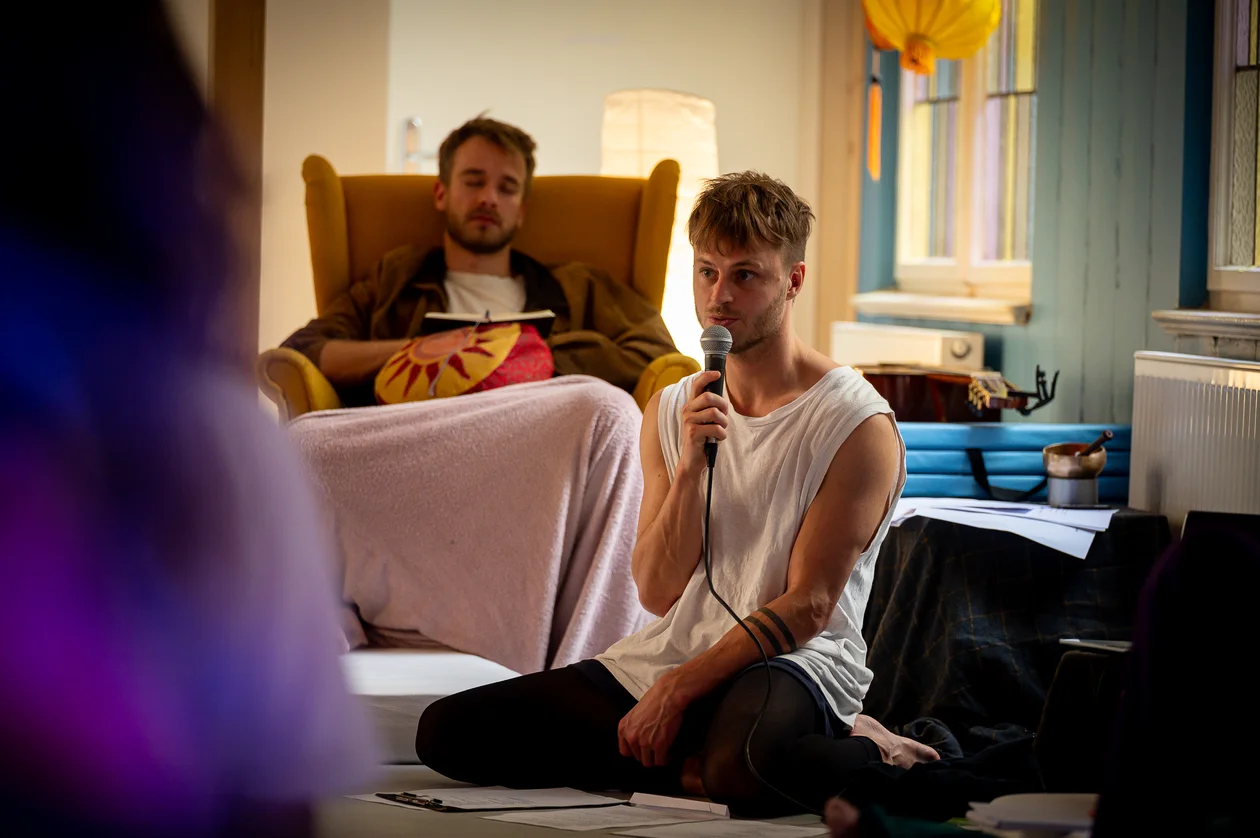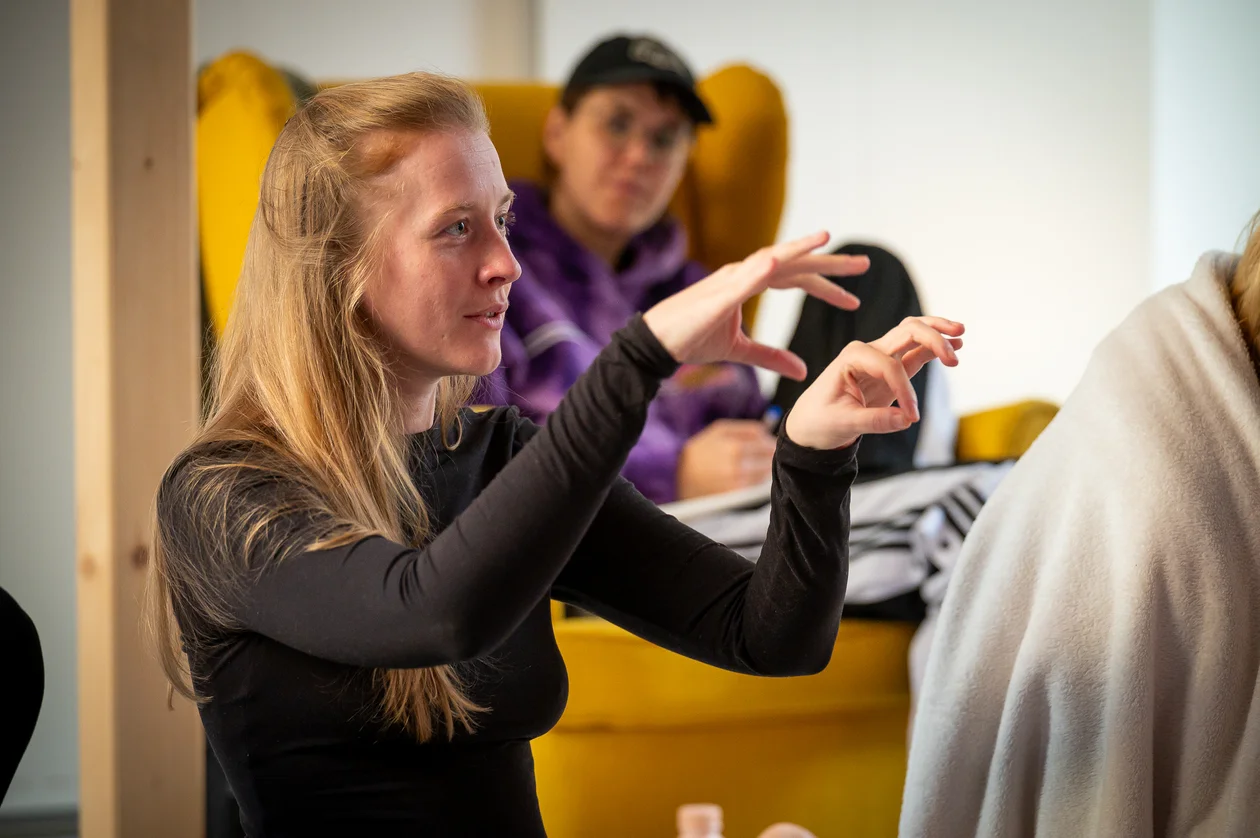Safe&free: In Connection
Part of Ambassadors For Humanity
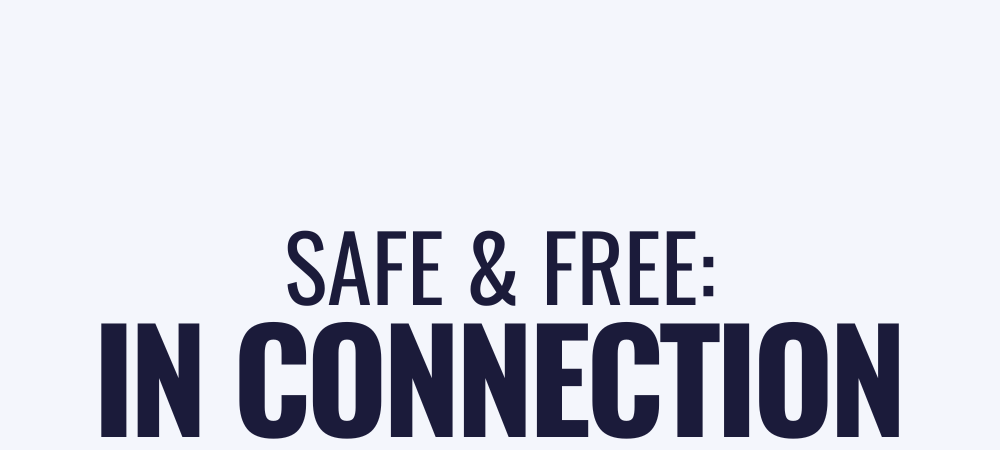

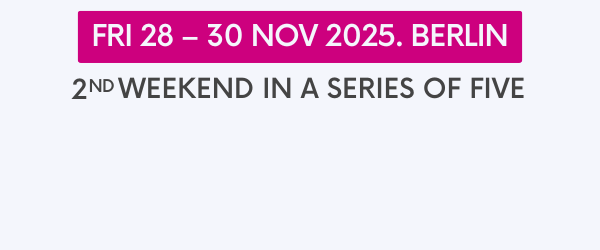
Do some of your relationships Feel flat, distant, or unhealthy?
- You don't show emotions or needs and feel disconnected from the other person?
- You overreact, freeze, or pull away, instead of vulnerably expressing what’s true for you?
- You fall into the same old patterns and sometimes even watch yourself doing it?
- You want to make a change but don't know where to start?
“I am deeply grateful to Mette for planting the seeds... For creating a space where we could grow roots of authenticity and from there, dare to step into the world a little louder, a little freer, a little more unapologetically ourselves.”
— Dila (Path of Real Moments)
Instead, do you want to Welcome all of you in connection?
- Understand your nervous system and how it shapes relational dynamics?
- Be okay with differences and feel connected even when your needs, feelings, or views don’t align?
- Express more of yourself sooner so small things don’t become big issues?
- Create a healthy relationship culture that supports you in welcoming all of you?
“The workshops felt like a secret hidden place in nature: warm, sunny, and safe. I felt relaxed and free, which created excitement and curiosity to explore.”
— Nora (Path of Real Moments)
Take a step in this direction Join us for a weekend
I'm Mette Koppelaar, and with my team we create supportive environments for meaningful learning, experimentation, and play.
This weekend is part two of a series of five and will be hosted by Anna Schmidbauer and me (supported by two assistants). This weekend helps you see which relational dynamics prevent you or empower you to connect more fully with others and yourself.
Let’s get concrete What you’ll learn
Where weekend 1 is about understanding your nervous system and welcoming the different parts of yourself, this second weekend focuses on using your relationships to create safety and permission for each of you. You’ll learn to:
In any relationship (romantic, family, friendship, or work), reactivity can block vulnerable expression and authentic connection. Reactivity means slipping into a pattern of thinking, feeling, and acting without consciously choosing it — often in ways that aren’t helpful.
The drama triangle
Stephen Karpman’s Drama Triangle describes three common ways of becoming reactive. No model captures everything, but catching yourself when you fall into one of these roles is a great starting point for seeing what you can change in yourself to improve your relationships:
- Persecutor: You blame, criticize, or get angry and judgmental. Your thoughts and actions center on who is “wrong.” Some phrases for this role are: “You’re bad,” “You should,” and “You shouldn’t.” It can also look like self-judgment: “I’m bad/should/shouldn’t.”
- Victim: You feel powerless or mistreated. Your attention goes to what has happened to you. The phrase here is: “Poor me.”
- Rescuer: You work hard to make things better for the other person. Maybe you want to feel needed. Maybe you try to make them feel better as a way to avoid your own discomfort of being around their feelings. Either way, the phrase here is: “Poor you.”
The triangle meets the nervous system
These roles are connected to the unsafe nervous system states that are the focus of weekend 1 (introduced here). Just like your nervous system can shift from one state to another in seconds, you can also move rapidly between these roles. You might feel like a victim one moment, blame someone the next, and then rush in to rescue them from feeling bad about your words.
Here's how the roles and the nervous system states are connected:
- Persecutor → fight/flight
- Victim → collapse
- Rescuer → fawn (also called please or appease)
Stepping out of reactivity
Learning to recognize which nervous system state or drama triangle role you’re in can give you a way out of reactivity. You can learn to notice it, take a pause, and bring your nervous system back to safety — instead of staying caught in the pattern.
Returning to safety
Once feel safe again, qualities like curiosity, compassion, connection, and creativity come back online. From there, it’s easier to move into open, vulnerable communication. This enables a shared exploration of each other’s inner worlds and creates space to get creative about shaping the moment together.
Which is what we’ll explore in step 2.
(Pro-tip: Spotting the drama triangle roles in yourself is powerful. Calling them out in others rarely helps. Their nervous system may be too activated to hear it, which push them further into the state or shift them into another one. Instead, create some space for yourself and return to the conversation later, when both of you feel safer.)
Creating relational safety
Together, you can build a relationship culture that supports both of you in feeling more safe. In such a relationship, you:
- Gently look out for unhelpful behaviors: Instead of blindly falling into reactivity, criticizing, or pulling away, you realize that reactive behaviors are a signal that more safety is needed.
- Return to regulation first: When unsafety takes over for one or both of you, you prioritize coming back to regulation, alone or together, before trying to deal with the “contents” or the situation that caused it.
- Cultivate interdependence: Rather than doing everything alone or becoming overly dependent on each other, you choose what’s right in the moment: look after yourself, offer support, request support from the other, or request it from someone else, like a professional, a friend, or another colleague.
Creating relational permission
When there’s enough safety, you can start creating a culture that offers permission to vulnerably share your inner worlds. That means you:
- Welcome each of your parts. Recognize that each person’s experience is made up of many parts, and each of them is allowed to exist.
- Understand revealing is not reacting. When you build a habit of revealing your parts without the need to act from them, your nervous system slowly becomes less reactive to someone’s parts and more appreciative of them.
- Cultivate curiosity and compassion. The more openness you develop to the other’s inner experience, the more you learn to welcome your own. And the more you can welcome your own parts, the more you can welcome the other’s.
- Separate the now from the past. The more loving kindness you can offer each of your parts, the clearer it becomes how often parts are not responding to the present but to the past. This opens the door to new ways of relating, understanding each other, and healing together.
From perfection to discovery
When you manage to create a culture of safety and permission, you no longer have to show up perfectly. Instead, you can use interactions to discover more of yourself. It becomes a place where you can get to know yourself and each other on a deeper level. When you manage to create this culture, it won’t only exist between you, but also within you. Meaning you have some access to it in other relationships, too.
I’ll explain how to start creating this culture in step 3.
Does all of this sound good in theory, but do you wonder how to actually build this kind of relationship culture and live it—week by week, day by day, moment by moment?
It starts with willingness
For this process to work, everyone involved needs to be on board. You can’t force anyone to do this. If the genuine willingness is there, there are certain things you can learn and practice to make this change happen. Here are some of them:
- Framing: Set intentions and make agreements about how you want to relate — in your relationship as a whole, for a particular evening, or during a specific conversation or interaction.
- Naming: Practice “tracking”: describing your inner experience from moment to moment. This helps you get to know yourself, welcome your inner experience without judging it, and do the same for the other person. It also helps to establish a so-called shared reality.
- Communication structures: Use simple structures to make difficult conversations easier. There are structures for many types of conversations, like: revealing things you’re holding on to, expressing emotions, negotiating desires, discussing what is and isn’t working, voicing appreciation and gratitude, reality-checking your fears, and more.
- Repair: Learn how to repair after something went “wrong.” Once you learn this, the safety of the connection no longer depends on everything going perfectly. Instead, it empowers you to come back together after a rupture. The combination of rupture and healthy repair can often lead to more safety and connection, then if there would have been no rupture at all. This is where true resilience lies and lots of growth happens.
Practice regularly
Once you’ve practiced these skills in a supportive environment, it’s important to practice them regularly. This both develops the skills and creates a habit. It’s helpful to pro-actively create moments to practice them with each other. This can be a weekly check-in conversation with your flatmate or boss, a daily moment of conscious physical contact with your partner, or an annual evaluation of your relationship. Together, you can frame how you can design this moment to create safety and permission for each of you. After, you can reflect on if it’s working for you, and re-negotiate the setup if needed.
Watch it spill over into life
Over time, you’ll get more comfortable using these skills in everyday life. When something challenging comes up, you’ll be able to name it lightly instead of getting reactive — not every time, but more and more. You’ll also learn the importance of naming what is working. Each time you do any of these things in a wholesome way, you add a little more safety and permission for both of you. And in doing so, you slowly steer the ship that is your relationship towards a healthier, more sustainable, and more authentic direction.
I explain some of the theory in the video below.
How do you create freedom & safety within relationships? How can you use nervous system awareness to avoid drama? How do you create a relationship that welcomes and empowers the individuals and their differences? Watch the video. (It helps to watch the first weekend’s video first.)
Skip to what interests you:
- 00:00:00 — From individual to relational
- 00:00:59 — Cultivating safety & freedom in connection
- 00:07:19 — The drama triangle (meets the nervous system)
- 00:16:12 — Safe states of the nervous system
- 00:18:52 — Empowering relationships
- 00:23:50 — Group conversation & outro
“I was able to reflect on myself again and again. The positive environment made practicing so much easier, and I’ve continued to develop.”
— Franzi Redeker (Path of Real Moments)
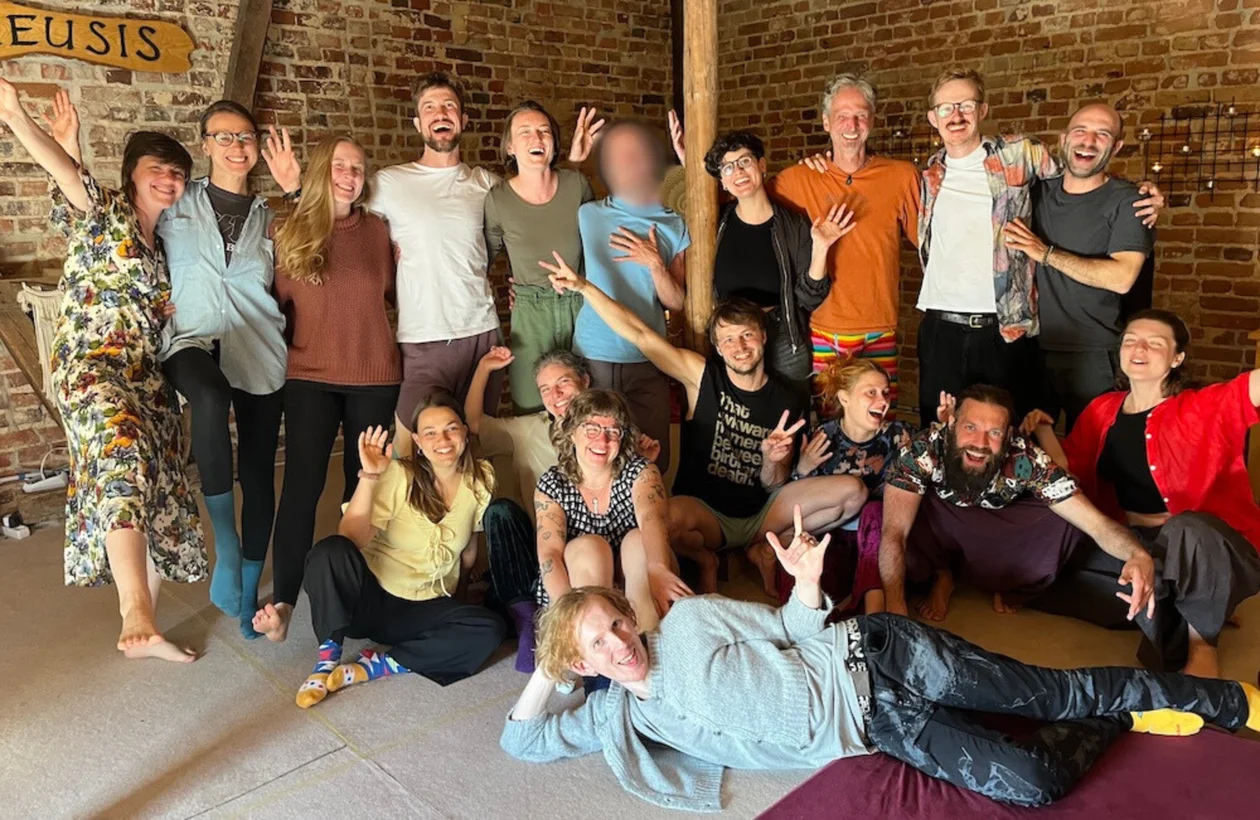
When, where, quanto costa? The practicals
We’ll start the weekend on Friday 28 Nov 2025 (at 18:30) — at the beautiful KARA Kulturraum in Berlin. We’ll say our goodbyes on Sunday 30 Nov at 17:30. It’s possible to stay over and enjoy the group energy all weekend.
With 20+ contact hours, the weekend allows for a slow start, a soft landing, and many meaningful experiences in between:
- Fri 28 Nov 2025 (18:30 – 22:00)
A nurturing evening, focused on landing, connecting, and starting the weekend. - Sat 29 Nov (10:30 – 22:30)
Daytime practices/experiences to deeply connect with the theme of this weekend. A less structured evening focussed on connection, co-regulation and/or co-creation. Perhaps an alternative thanksgiving dinner? (Let's decide together!) - Sun 30 Nov (10:30 – 17:30)
More practices/experiences to deepen and start integrating the journey in everyday life.
Zoom call
- Tue 16 Dec 2025 (19:30 – 21:30 CET)
Integration call 👩🏼💻 - Tue 13 Jan 2026 (same time)
Community call 👩🏼💻
For full program participants and those joining weekend 2 and 3. - Tue 27 Jan 2026 (same time)
Community call 👩🏼💻
For full program participants and those joining weekend 2 and 3.
Curious?
To spend a weekend with people looking for meaningful connection, sign up or book a free discovery call with Mette.
Practical:
- Group size: 10–25 lovely humans
- Availability: Weekend 1&2 are almost full, so join now.
- Language: English
- Preparation: When you join, you’ll receive a free copy of part 1 of Mette’s book, which you're invited to read.
- Bring: comfortable, layered clothing, pen&paper, a water bottle, a meditation pillow (if it’s not too much hassle), snacks for in between meals—and whatever brings you comfort or joy. Bring one item that represents safety and one that represents permission, so we can make an altar for each. Bring snacks to share, and lunch/dinner if you don’t want to eat out or order.
Venue, food, staying over:
- Venue: KARA Kulturraum, Berlin (google maps). It's a beautiful, queer, collaborative art space in Berlin Moabit. Photos and accessibility description below.
- Accommodation: It’s possible (and fully optional) to stay at the house on Friday and Saturday night. For €20 per night, you’ll receive a mattress, pillow, duvet, pillow cover, & duvet cover. Please bring a bedsheet. You’ll either stay in the workshop space or in another shared space. Limited availability.
- Food: You can bring your own food or go to one of the nearby restaurants during the breaks. Some people will typically eat together. (There is a fridge+freezer and kitchen at the venue for light meal preparation.)
- Accessibility: There is a ramp and extra bell that can be reached without climbing stairs at the entry. The house has no thresholds. There is an accessible bathroom and shower. The garden can be reached via the garden gate. The only non-accessible parts of the house are the two mezzanines that allow for extra space. There's a parking space available right in front of the door in the backyard. Please get in touch if you require any assistance.
- Pets: You can't bring your super cute doggie. I'm sorry.
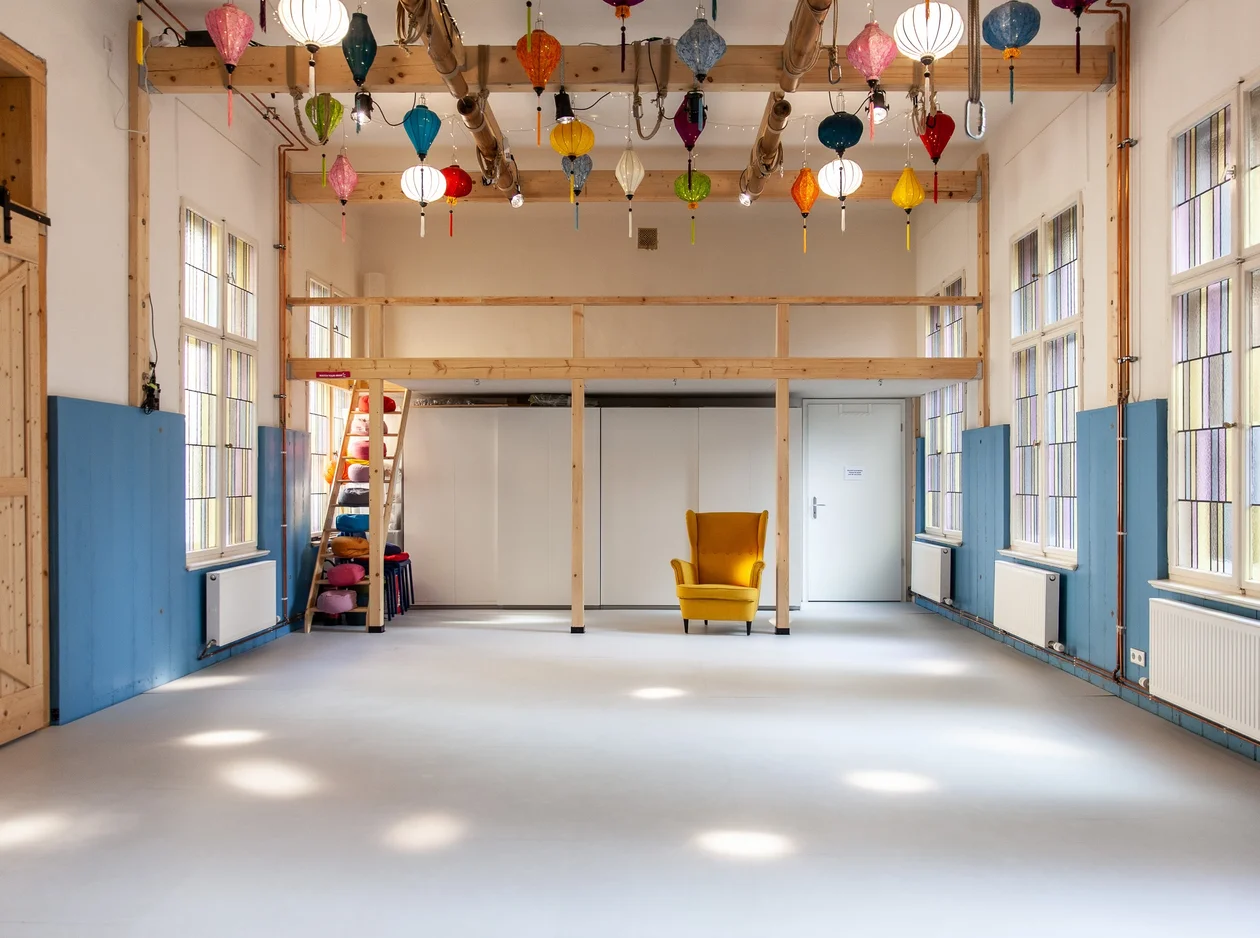
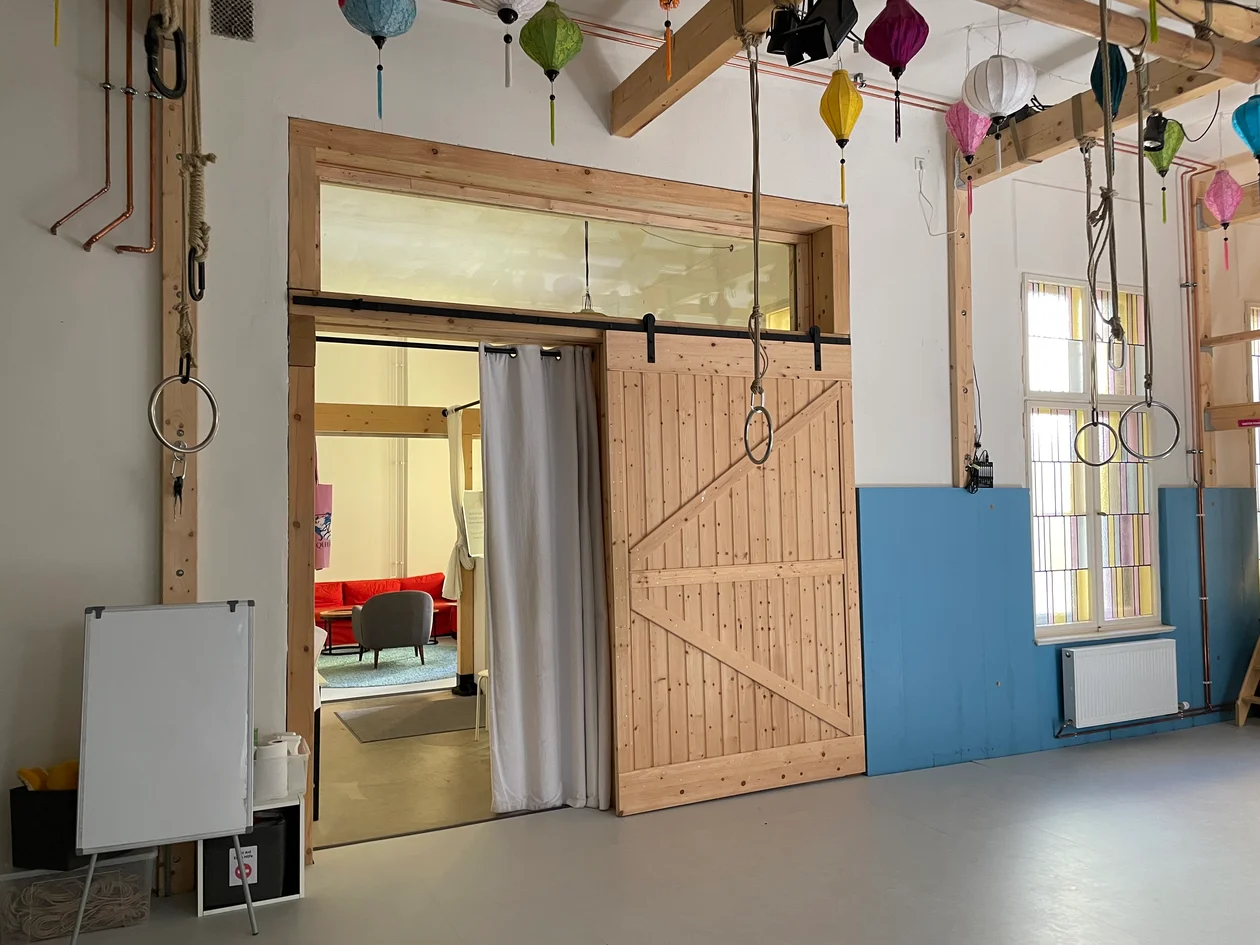
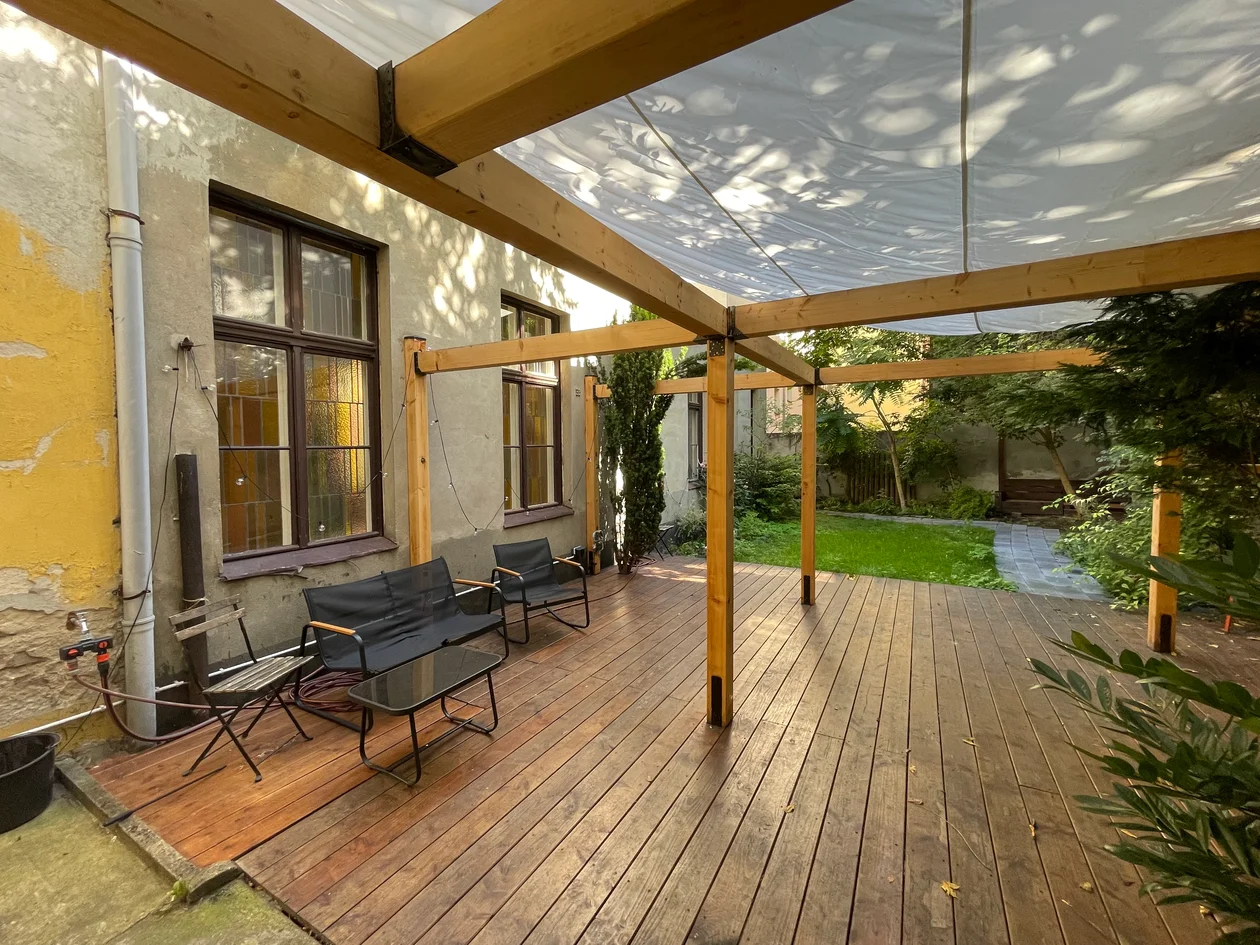
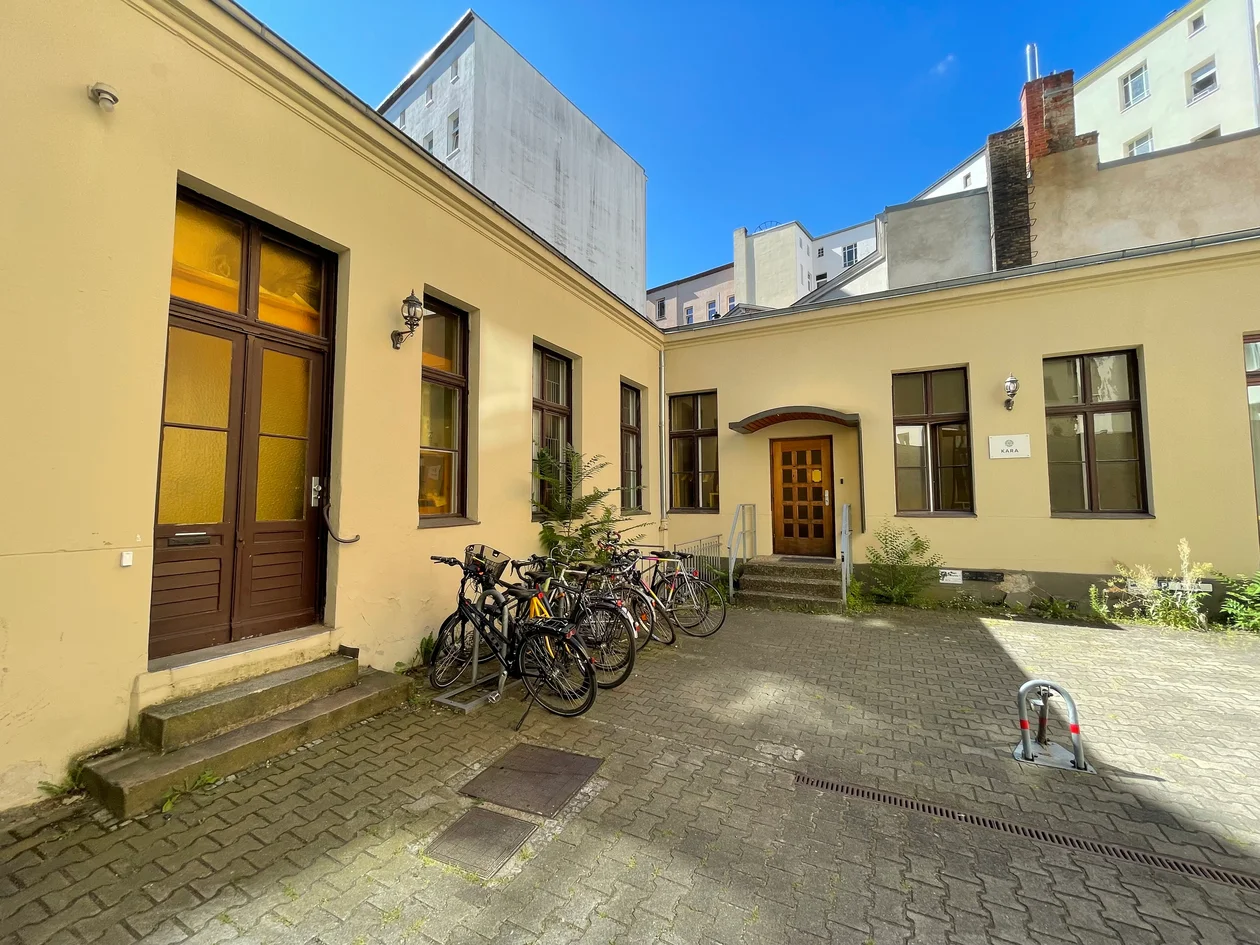
Can you picture yourself here?
Sign up or have a book a free discovery call with Mette.
Prices, helper spots, scholarships, and paying in installments
Text me on Telegram to discuss what might be right for you:
-
Join this weekend: €325
Minimum price for joining a single weekend. -
Join 2 weekends: €305 / weekend
Includes the weekends and all in-between calls. -
Join 3+ weekends: €290 / weekend
Minimum price for 3–5 weekends. -
Join sustainably: €690
The fully sustainable price for joining a single weekend. (or choose any number in between) -
Discounted spot: €244 – €310
Available thanks to a generous donation ❤
Preference for those joining weekend 3, or joining more than one weekend.
Includes 19% VAT. -
Helper spot: €140 – €250
Help out with some practical tasks in exchange for a lower price. -
Not sure what to choose?
There are many ways to make this work. Just text me on Telegram or book a call, and we’ll probably figure something out together :)
What you’ll get for this
Each weekend includes:
- 20+ contact hours in person
- A two-hour follow-up call on Zoom
- Early access to part 1 of Mette’s book.
- Ongoing peer support and connection in the Telegram Group
- A committed group of peers who prioritize growth and connection.
Pay in installments
It's possible to pay in installments. This brings more risk and administration on my side, so it costs a little more:
- Pay in 2 installments: 1.5% fee
- Pay in 3 installments: 3% fee
Make your choice
You can indicate your price preference in the signup form.
Priority for helper spots and scholarships is given to those facing challenging situations or with marginalized identities.
Unsure what to do? Book a call call or message me on Telegram.
“A lot of thought, love and vulnerability went into creating this course. Together with a very caring team of wonderful people, Mette created sessions that felt very balanced with theory parts enriched with very personal examples and exercises to actually experimenting with it myself.”
— Sarah (Path of Real Moments)
Who’s creating this? Meet the facilitators
As a team, we come from different walks of life—and are united in our wish to contribute to a world where all people can flourish and grow.
We strive to hold these weekends in a responsible, trauma-informed way, but also show up as the humans we are, and are genuinely open to connect — whether through genuine conversation, hugs, or dances; laughter, tears, or play.
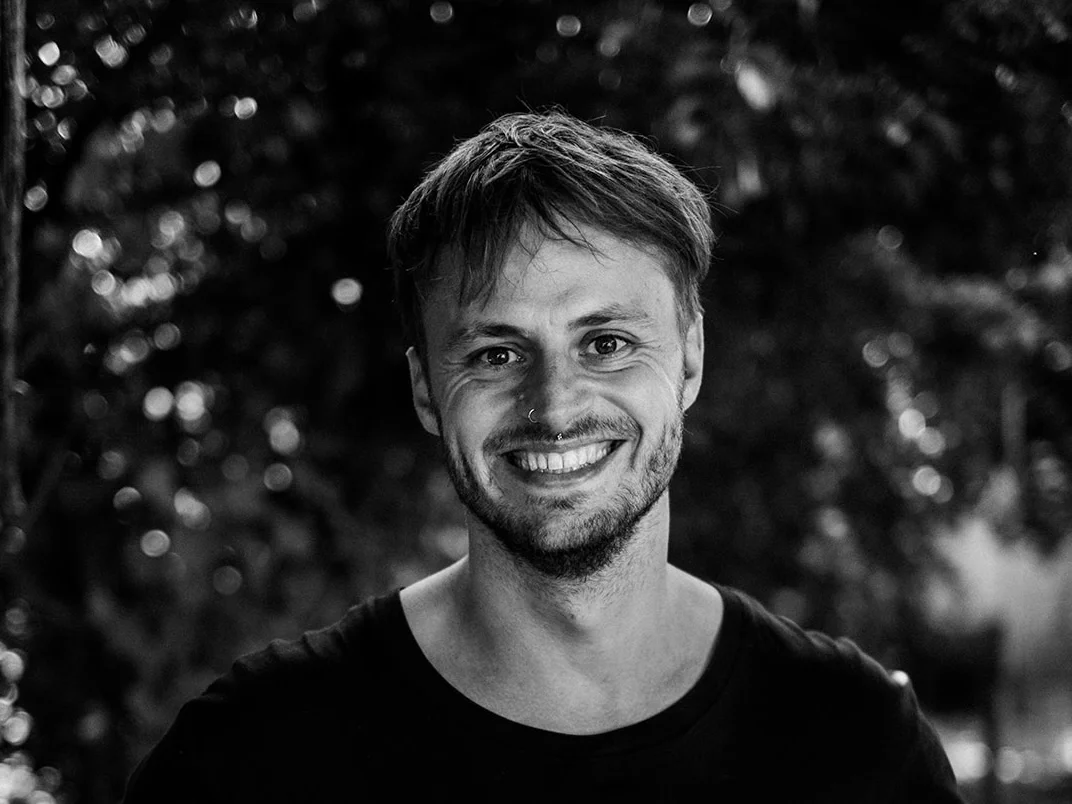
Mette Koppelaar (1984, they/them)
Facilitates weekends: 1 / 2 / 3 / 4 / 5
I see authentic self-expression as a way to welcome more of myself, build deeper connection, and contribute to a more loving world.
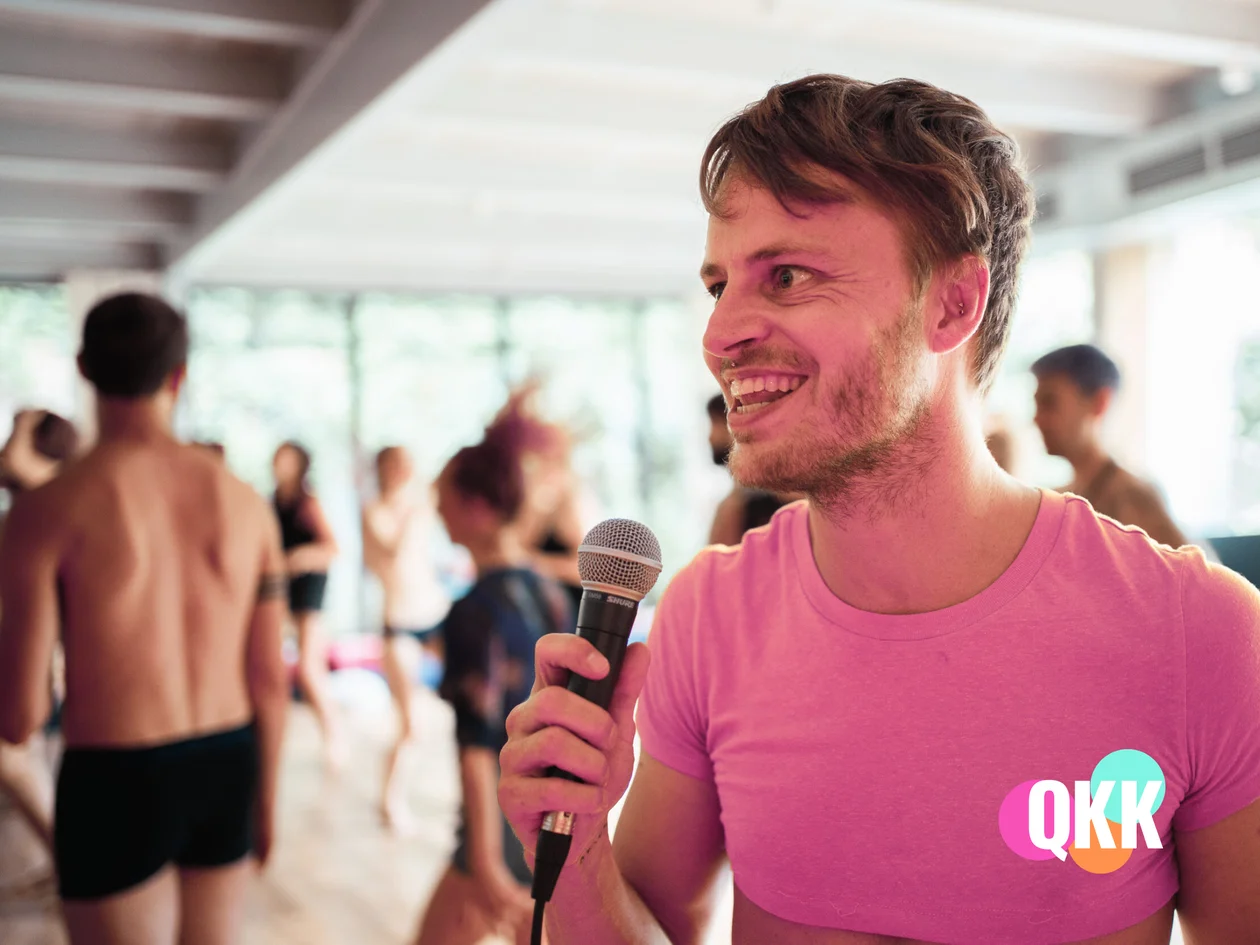
As a facilitator, I create spaces where people from diverse identities can be true to themselves, build trust, and contribute to a culture of freedom and care. I use frameworks like:
- The Pyramid of Permission (developed by me)
- Polyvagal Theory
- Internal Family Systems
- Wheel of Consent
- Nonviolent Communication
- Diamond Approach
- Buddhism
My approach is simple: when there’s enough outer safety and permission to express yourself, you’ll meet the edges of your inner safety and permission. Having positive experiences at your edges, you can slowly become more comfortable with a wider range of expression. Over time, this allows you to reveal more of yourself in more areas of life.
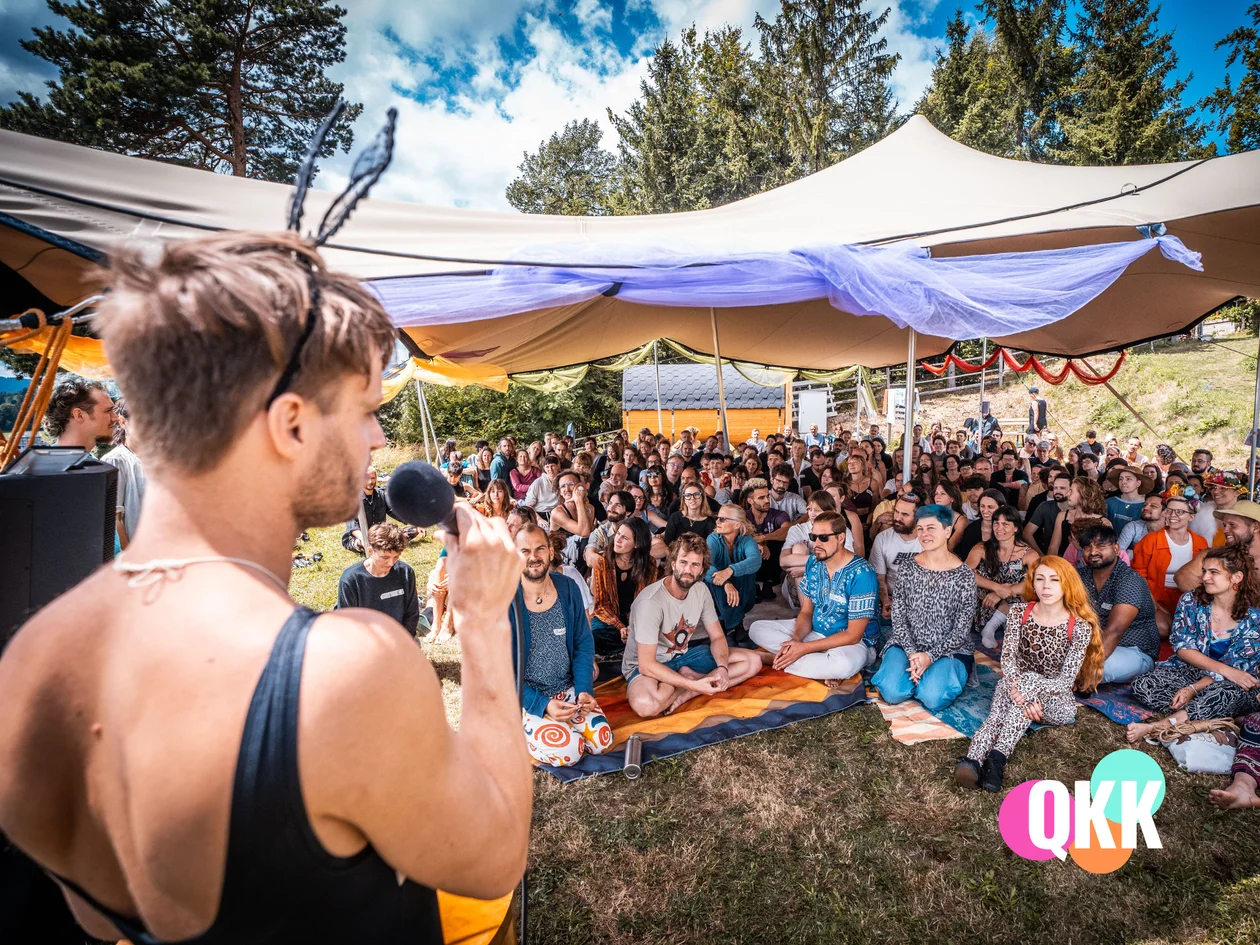
My lens and ambition
I was born in Amsterdam in 1984. I’m white, able-bodied, middle-class, and gender nonconforming, using they/them or he/him pronouns. I grew up with safety and stability, with parents who spent years in group therapy before I was born. I haven’t faced war or poverty, and my passport allows me to travel freely—privileges I’m increasingly aware of.
At the same time, dressing outside gender norms has shown me what it’s like to not always feel safe on the street. Research, book interviews, and many personal conversations have deepened my understanding of societal oppression—especially for those whose identities are most targeted.
What began as a search for personal freedom has turned into a deep longing for a free, just, and equal world. It’s what I strive to contribute to in my work and daily life—one real moment at a time.
Connect with me
Book a free call, join my mailing list, Telegram channel, or Instagram — or watch some of the videos below this photo:
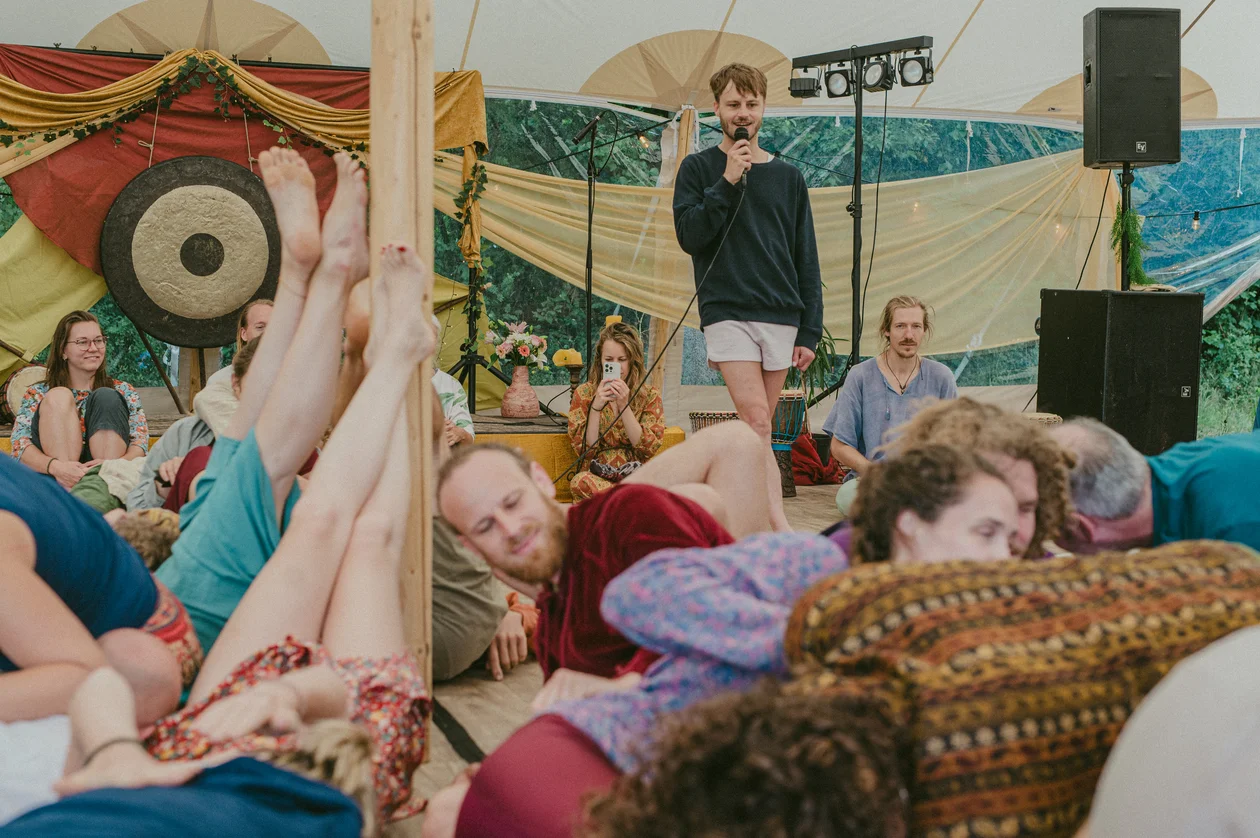
Watch me talk
Why I created Ambassadors For Humanity:
How dressing outside the norm led me to do this work:
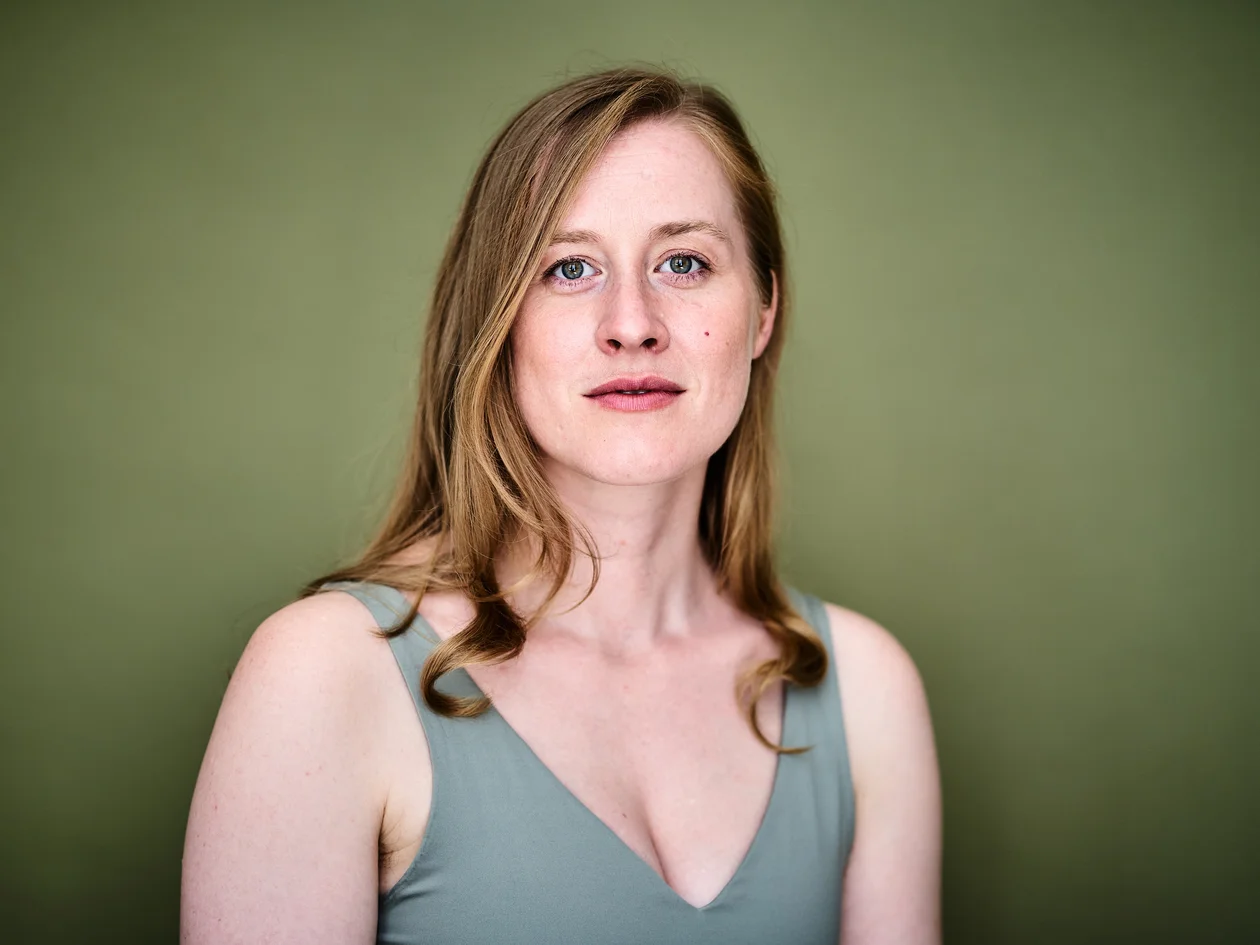
Anna Schmidbauer (1989, she/her)
Co-facilitates weekends: 1 / 2 / 3 / 4 / 5
“With my earliest professional roots in social work, I have dedicated 15 years of my life to working with children and teenagers. Learning and deepening most of my current work ethics through and with them, I have offered creative conflict resolution camps out in the wilderness, democracy camps, Czech-German youth exchanges as well as early childhood rhythmic education. I have worked in juvenile detention as well as in Waldorf kindergarten. This wide range of fields has informed and shaped me deeply.
Later, when I started a new professional chapter with being trained in the Pantarei Approach, I realized that the aspects which fascinated me most about the work with children, were also the key elements that unlocked fertile and fruitful processes in the somatic coaching processes of my clients.
Believing in the power of our heartfelt visions and dreams, I am now supporting entrepreneurs who wish their work to be a holistic, just and sustainable contribution and possible solution to some of today’s pressing issues. One of my main goals in this work is to support my clients and their bodies in offering what is most meaningful to them, without setting themselves up for burnout.
I believe in the courageous act of unlocking innocence, play, expression, fascination, excitement, honesty and hope - qualities I have seen and immersed myself in in their purest form in my work with children. When those qualities are allowed to be part of our healing work, of much needed activism and new work models, there’s the potential to experience them beyond the real risk of them being ‘fluffy love and light’ escape strategies.
I’m grateful and joyful to be part of the upcoming Ambassadors for Humanity journey, and look forward to us researching and weaving together.”
“Mette was authentic, vulnerable, clear and humble. A beautiful combination for a spaceholder.”
— Jonas B. (Facilitate Your Life)
You’re so welcome to Spend these days with us
This weekend is almost full:
You’re so welcome to join us ❤
- Join this weekend (or more):
Open the signup form - What it costs:
Price overview - Unsure?
Book a discovery call (with Mette)
If you can, please sign up early — it gives you time to prepare (mentally) and tells us who to expect.

“It’s really not that cold!”
– some annoying person who jumped in the water before you
Many people spiral back and forth between yes and no. But not all spirals are the same. Here are two types of doubts people tell me about:
1. Actual life concerns:
- “I have wayyyyy too many things going on. Adding something will send me straight into a burnout.”
- “I know it’s not the right time, but I fear this is my last chance! ”
- “I'm really low on cash, and spending more money will affect my ability to pay rent or buy food.”
If this is you, then now is probably not the best time to join. (Maybe read about nervous system regulation through shaking on my Telegram.)
2. Fear of doing something new:
- “Part of me is excited! But I’m also a little afraid”
- “I have little experience in these spaces — and I fear I’ll be the only one.”
- “I don’t yet know anyone there — and I fear I’ll feel awkward or alone.”
If this is you, it’s what I call “normal” fear or resistance. So, at the risk of sounding persuasive, here’s my take on it:
- You won’t be the only inexperienced one. Most participants don’t yet know each other. Rather, we all start to form a deep bond over the course of experience. That’s the beauty!
- Many people have these kinds of fears — especially the first time. In fact, it’s almost prerequisite for joining because it shows you’re on your edge of growth.
- Sometimes, it’s helpful to stop overthinking, remember that you can always leave, and take a leap of faith. Often, the annoying person turned out to be right: the water really isn’t that cold.
Break the spiral by having a chat with me on Zoom. In 15-20 minutes, you’ll likely find more clarity than after days of thinking about it. We can talk about the retreat, a specific challenge in your life, or simply make small-talk and have a laugh.
This weekend belongs to Ambassadors For Humanity.
There are four more weekends
...which can be joined separately:
- 31 Oct – 2 Nov 2025
Safe & free within yourself
Check out weekend 1 - 28–30 Nov 2025
Safe & free in connection
Weekend you’re currently looking at - 6–8 Feb 2026
Safe & free in community
Check out weekend 3 - 6–8 Mar 2026
Envision your path
Check out weekend 4 - 10–12 Apr 2026
Embody your vision
Check out weekend 5
Not this time?
Check out all my events, follow me on Telegram, Instagram, or Facebook. Or join the mailing list:
“Looking back at the impact this journey continues to have on my life, I'm full of love, appreciation, and gratitude for the team and every participant who made this so special and beautiful.”
— Kéan K. (Path of Real Moments)
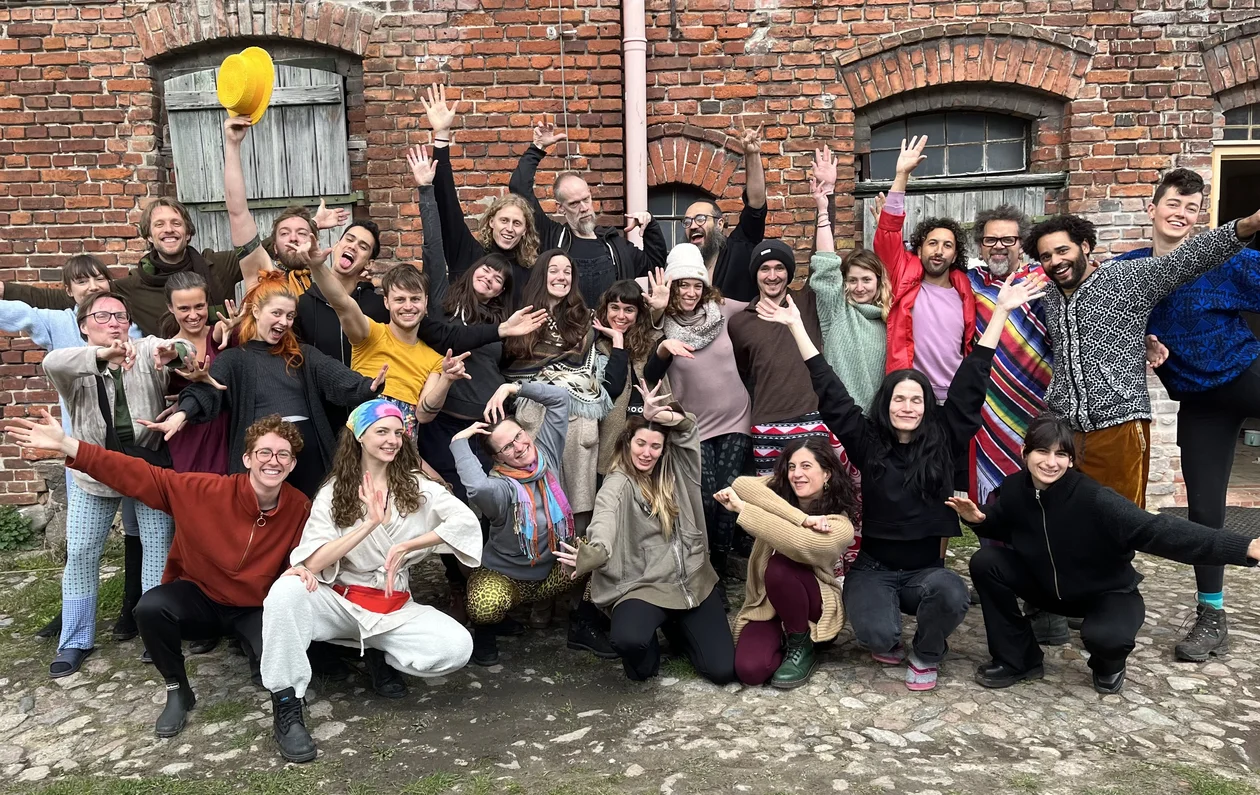
Yes, we take this seriously: Values & accountability
How we take responsibility for the space:
The following values are the foundation for all my work. If these don't resonate with you, then we may not be a match. Of course, these values are always a work in progress. If something about them doesn’t feel right, or if you have ideas for improvement, I would love to hear from you. Message me on Telegram or through the contact form.
If it ever feels like I or any of the team members don't live up to these values, I would love for you to tell me.
- Authenticity: Everyone's invited to verbally, physically, and emotionally express themselves. We can play with our expression without justifying ourselves, yet we strive to do so in a way that’s considerate of other people.
- Inclusivity: We welcome all identities and personal backgrounds. We try to notice the judgments and assumptions we make about others, and question racism, sexism, ageism, ableism, homophobia, transphobia, or other discriminatory beliefs or behavior.
- Consent: We respect each other's space, stuff, boundaries and privacy. We share a responsibility to create a safe environment for ourselves as well as for others.
- Confidentiality: We don’t share about other people’s experiences. We don’t comment on other people’s experiences without their consent.
- Self and group responsibility: We’re try to look after our own well-being and ask for help when we need it—even when we don't know what we need. We try to be aware how we take up space, and strive to contribute to the safety of the group.
- No sex or romance with team members: Team members don't share arousal, sexual energy, or romance with participants. (We might like to share hugs or other forms of touch though!)
- No intoxication: We don't consume drugs and alcohol during or before the event, and limit the use of phones/devices in public spaces.
Lots of beautiful things can happen in spaces like these. You may also encounter interactions that don’t work for you—even when everyone has the best intentions. This can often be repaired when everyone involved is willing to have a vulnerable conversation about what happened.
If you have an unpleasant experience with a team member or fellow participant, I encourage you to reach out to them directly. If that doesn’t work or feels like too much, you’re very welcome to contact me (Mette) via Telegram or the contact form, or to contact any other team member. I/we may be able to support you and won’t take any action without your consent.
If you have an unpleasant experience with me (Mette), you're invited to reach out to me directly, contact another team member, or approach my accountability partner Anouk Bongers. She won't communicate with me unless you consent to it. You can find her contact details here.
If you’re still carying something that happened a long time ago, I want to acknowledge that it can take time to process certain experiences. Sometimes months or years. The offer above remains valid. There’s no such thing as reaching out too late.
(To see the actual prices, click here)
Working independently in a sustainable way comes with many invisible costs. Because event prices in this field are sometimes perceived as high or ‘commercial’, I want to be transparent about how they are calculated — and how different price levels work out for me.
Please don't let this overview stop you from joining or from requesting a price that’s workable for you (and make sure to check the actual prices) All I ask is that you understand what each price point translates to on my side.
| The fully sustainable price per weekend (incl. VAT) | €690 |
| If I let go of... | The price is... |
| Nothing | €690 |
| Attending trainings & events to improve & promote my work | €624 |
| Taking vacation | €558 |
| Taking time off on public holidays | €531 |
| Taking time off when I'm sick | €505 |
| Being insured for when I truly can't work | €478 |
| Saving up for business challenges | €409 |
| Saving up for my pension | €271 |
| Adding to my personal savings | €202 |
I will still choose to take time off when I’m sick and take vacation. Not having the full income means that when I do these things, I have to take that money from savings or pension.
I don’t expect everyone to pay the full price
Most people won’t — and that’s OK.
I just want to make visible that when someone pays less, the difference has to come from somewhere. For example: if twenty people each ask for €75 discount, that means I'll either need to find a donor or take €1.500 out of my savings/pension.
Some reflective questions you can consider:
- Do you have a job, savings, financial support, a family you can rely on, or time to make some money on the side?
- Do you have stable housing, citizenship, and good health? Do you frequently encounter systemic oppression or discrimination?
- Can you afford to spend time and money on eating out, events, yoga, vacation — or does most of your money go into housing, food, and health?
- How many people depend on you financially — such as children, sick family members, or family abroad?
- Knowing what this program can contribute to your life, is there truly no way to source the money? Or would you simply prefer not to put in that effort?
The actual calculation:
If you’d like to understand the prices in more detail, here’s a description of the calculation:
- I aim to work 5 days a week, 8 hours a day. Out of those hours, roughly 40% of my time goes into things like admin, general promotion, and other general tasks. This means I have around 24 hours per workweek to make my income.
- On a yearly basis, I have to account for vacation, sick days, public holidays, festivals where I work for free to make a name for myself, and the time I spend on training that lets me do this work in a responsible, trauma-informed way. Which leaves me with around 38 work weeks per year.
- This means I have to make my entire annual income in 24 x 38 = 912 hours per year, or 76 hours per month.
- I spend at least 460 hours on one edition of this program:
- 145+ hours of preparation: developing the program; promotion; venue communication; setting up a team; handling signups and cancellations; chasing payments; communicating with participants, helpers, team members, and the venue; shopping; and many more small tasks.
- 275+ hours for preparing and facilitating the actual five weekends
- 40+ hours for preparing and hosting the online calls
- Besides the time investment, I spend money on overhead costs for my business, renting the venue, paying team members, and buying materials I need for running the program. Depending on how signups are going, I might have to spend money on online promotion, printing flyers, etc.
- Now, to earn the median salary for someone my age (41) in this part of the world, I have to generate a shocking €104 for each hour that I work on this program (excluding VAT). To achieve this, I would need to have 20 signups for an average of €3.450 per participant, or €690 per weekend (including VAT).
- To make this program more inclusive, I've lowered my salary to less than a third of the median, which greatly reduces the price, which means I rely on additional donations to make it work. It also means that for everyone paying less, there needs to be someone paying more.
- While this enables more people to come to the event, the impact on me is that I have a very low salary and very little security: I basically cut out all of my safety nets. I don't save money, I don't save up for a pension, and I don't have disability insurance. This works as long as I'm healthy, have access to cheap housing, and don't have kids or anyone else to care for. But it offers very little security—now and later in life—and I would be properly screwed whenever I have any medical challenges.
So yes — it's complex...
Thank you for reading all this. If you want to share your reflections—or make a financial donation to support me in offering this work at a price that others can afford—you can message me on Telegram or through the contact form.
Or click here to see the pricing options.
Most of the workshop photos were taken by Mio Schweiger. The portraits, group photos, and space photos were taken by others.
You scrolled a loooong way. Now, choose wisely:
- Ready to join? Signing up takes just a few minutes
- Have specific questions? Schedule a free intake call with Mette
- Want to stay in the loop? Follow me on Telegram, Instagram or Facebook

